Entry Requirements for American Travelers to France
Inspiration

Reading time: 0 min Published on 4 January 2023, updated on 16 April 2024

PASSPORTS AND VISAS
All U.S. and Canadian citizens, including infants, need a valid passport to enter France. Visas are not required for American and Canadian visitors staying in France for up to 90 days. For more information, contact your nearest French Consulate. See a list of local French consulates in the U.S.
It is mandatory in France to carry some form of identification at all times. If you lose your passport, the nearest U.S. Consulate will issue Americans a limited-validity replacement if travel is imminent, or a full-validity passport if further travel is not within two weeks. When in France, please carry a photocopy of your passport separately from your passport. The copy will facilitate issuance of a replacement ($75 fee for adults, $85 for children). The American Embassy in Paris is at 2, avenue Gabriel, tel. 01 43 12 22 22. The Passport Section is nearby at 4, avenue Gabriel (open 9a.m.-noon, Monday- Friday). There are other Consular Offices in Bordeaux, Lille, Lyon, Marseille, Nice, Rennes, Strasbourg and Toulouse that provide assistance to American citizens.
Entering France : Travelers from countries outside the European Union (EU) must declare certain articles when entering France. Duty and import taxes are levied on items not for personal use that individually or collectively exceed 175€ in value. Certain categories of items for personal use (tobacco products, alcoholic beverages, perfumes, coffee and tea, etc.) may be brought in untaxed up to certain authorized amounts. The following are forbidden or subject to strict control: drugs, radioactive materials, firearms, endangered species, plants, ivory and food, meat and dairy products. Carry prescriptions to authenticate any controlled substances. “Monetary instruments” equal to more than 10,000€ (whether brought into or taken out of France) must be declared. When in doubt, consult the French Embassy , a French Consulate or the French Customs and Excise Service's “ Info Douanes Service ” in Paris at tel. 08 20 02 44 44 (8:30 a.m.-6:00 p.m., Monday to Friday)
Re-entering the U.S. : Returning U.S. citizens who have been away for 48 hours or more are allowed to bring back, once every 30 days, $800 worth of merchandise duty-free. You're charged a flat rate of duty on the next $1,000 worth of purchases, and any dollar amount beyond that is subject to duty at whatever rates apply. On mailed gifts, the duty-free limit is $200. Have your receipts or purchases handy to expedite the declaration process. Note: If you owe duty, you are required to pay upon your arrival in the United States, using cash, personal check, government or traveler's check, or money order; some locations also accept Visa or MasterCard.
BRINGING YOUR PETS TO FRANCE
Travelers may bring dogs, cats and ferrets into France. Each family is limited to five animals, which must have valid rabies vaccination certificates and be identifiable by a microchip or tattoo. For more information, including details about travel with pet rodents, reptiles, birds or other species, visit www.ambafrance-us.org or contact the French Embassy.
- TWITTER - Follow the Embassy on Twitter

By France.fr
The magazine of the destination unravels an unexpected France that revisits tradition and cultivates creativity. A France far beyond what you can imagine…
Holidays at Galeries Lafayette

Air France, the best and most comfortable way to get to France

French Wine Tasting with Duclot La Cave

Gift vouchers for your shopping at Galeries Lafayette

The Christmas Windows Display and Characters

A Fairy Tale 1, 2, 3 Christmas!

8 Luxurious Boutiques in Paris

A historical and cultural melting pot in French Polynesia
Tahiti-French Polynesia

France Travel Restrictions
Traveler's COVID-19 vaccination status
Traveling from the United States to France
Open for vaccinated visitors
COVID-19 testing
Not required
Not required for vaccinated visitors
Restaurants
Not required in enclosed environments and public transportation.
France entry details and exceptions
Ready to travel, find flights to france, find stays in france, explore more countries on travel restrictions map, destinations you can travel to now, dominican republic, netherlands, philippines, puerto rico, switzerland, united arab emirates, united kingdom, know when to go.
Sign up for email alerts as countries begin to open - choose the destinations you're interested in so you're in the know.
Can I travel to France from the United States?
Most visitors from the United States, regardless of vaccination status, can enter France.
Can I travel to France if I am vaccinated?
Fully vaccinated visitors from the United States can enter France without restrictions.
Can I travel to France without being vaccinated?
Unvaccinated visitors from the United States can enter France without restrictions.
Do I need a COVID test to enter France?
Visitors from the United States are not required to present a negative COVID-19 PCR test or antigen result upon entering France.
Can I travel to France without quarantine?
Travelers from the United States are not required to quarantine.
Do I need to wear a mask in France?
Mask usage in France is not required in enclosed environments and public transportation.
Are the restaurants and bars open in France?
Restaurants in France are open. Bars in France are .
Ministère de l'Intérieur et des outre-mer
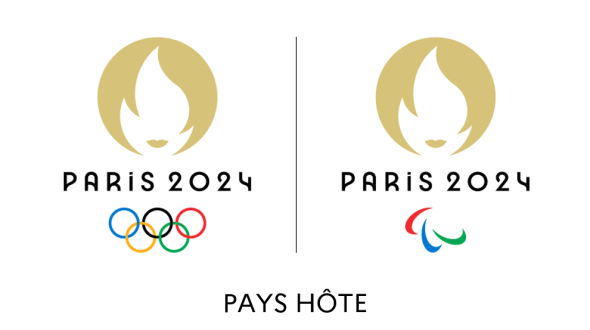
- Paramètres d'affichage
COVID-19 : International travel

Mobilising on a weekly basis up to 6,000 members of the civil security service to carry out tests, border guards to check travellers’ health documents and internal security forces to oversee the isolation or quarantine measures decreed by the prefects, this mechanism was duly adjusted in response to the changing health conditions and Community regulations.
In light of the latest developments in the pandemic, the port health control system has been discontinued, pursuant to the law terminating the emergency measures instituted to combat the COVID-19 outbreak.
Accordingly, the rules previously applied to travellers to France no longer apply effective from 1 August 2022:
- Travellers are now exempt from any formalities prior to entry into France, be it in mainland France or overseas, and no longer required to present a health pass, regardless of the country or place of departure;
- Justification of travel (the “compelling reason”) is no longer required;
- Travellers are no longer required to present a sworn statement of non-contamination and an undertaking to undergo an antigen test or screening upon arrival in the country.
The same applies to travel between mainland France and each of the overseas territories. Similarly, the French authorities no longer require any justification for outgoing travel from France, be it from mainland France or overseas, or any exit clearance to travel to another country.
However, foreign countries may continue to apply specific entry measures and formalities.
As of February 16th 2023, all passengers traveling from China are no longer required to present a negative antigen or PCR test result dated less than 48 hours, or a sworn statement. Random screening on arrival is also discontinued.
It is still recommended to wear a single-use surgical mask on board the aircraft.
Passengers from China making a stopover in a different country to reach France are invited to check the conditions applicable to transits.
Click here to find out more about Overseas Territories Travel.
Suivez-nous sur les réseaux sociaux
Paramètres d’affichage
- Go to the main menu
- Go to the mobile menu
- Go to main content
- Press Room Press Room

- Increase text size
- Decrease text size
- Add our RSS feed
Coronavirus - Statements
- Share on Twitter
- Share on Facebook
- Partager sur Linkedin
Latest news
Q: Given the progression of the Omicron variant, are operations being considered to return French citizens to France from southern Africa? A: Given the situation created by the identification and spread of a new variant that the WHO has classified as a “variant of concern,” and given the very (…)
Read more ...

Paris France travel requirements 2024: What American travelers need to know
We aim to keep this post updated about Paris France travel in 2024 with official Paris travel restrictions, requirements, and health and safety guidance. Our goal is to help you make informed decisions so you can travel confidently, safely, and responsibly in this new post-pandemic world of ours.
Paris is a destination close to our hearts, as Michelle has relatives in the city and studied in Paris in college.
As restrictions vary based on the traveler’s citizenship, we will focus primarily on those affecting U.S. citizens.
Last update: January 2024. Originally published: May 2021.
Disclosure: This post contains some affiliate links. If you make a purchase through one of our links, we may receive a small commission, at no additional cost to you.
January 2024 – Agnes Groonwald of Travel on the Reg , expats in France: “Tourism in Paris has seemed light since our move just outside of the city, but we also haven’t experienced the peak summer season yet. It’s still expected to book the big attractions (e.g. Louvre Museum) a few weeks ahead of travel, and dinner reservations remain a must at popular eateries.
Some locals and tourists are still voluntarily masking on crowded public transit and popular tourist destinations. Otherwise, it appears to be business as usual. There are no COVID protocols outside of doctors’ offices where masking is compulsory. Paris attractions, restaurants, and public transit are all operating without COVID-era restrictions. You can travel to/from the city without vaccine cards. That said, the city continues to struggle with regular disruptions to transit/worker shortages that require patience from travelers, but this has more to do with local politics vs. COVID. It’ll be interesting to see what happens during the Olympics.
The general tips for Paris travel apply. Leave plenty of time to get to/from attractions around the city and pre-book the big ticket items as soon as you know when you’re visiting.”
*At the end of the post, we share more on-the-ground perspectives from local residents and travelers to the Paris so you can get a true sense of what to expect.
Table of Contents
Can US citizens travel to Paris, France? Can I travel to Paris right now?
Yes, France is open to American travelers, regardless of vaccination status.
As of August 2022 , France removed all COVID entry requirements for any traveler from any country.
Testing, proof of vaccination, proof of recovery, proof of a compelling reason for travel, and sworn declaration about Covid contact and symptoms are no longer required .
Visitors from over 60 visa-exempt countries , including the U.S., will soon be required to have a European Travel Information and Authorisation System (ETIAS) travel authorization to enter Italy and other European countries . The start date has been delayed from 2024 to 2025.
See details about ETIAS here
Paris, France travel restrictions currently allow traveling between regions. However, as of May 2023 , short-haul domestic flights that can be taken by train in less than two-and-a-half hours are not allowed.
Effective March 2022, masks are no longer required in indoor spaces and public transport but still highly recommended in enclosed and small spaces, in hospitals, and other medical centers.
Quarantine rules in Paris, France: What happens if I get Covid?
Travelers are not required to quarantine upon arrival in France unless presenting symptoms of Covid.
Travelers who test positive for COVID-19 while in France are no longer required to self-isolate but are asked to observe the following guidelines:
- Wear mask, observe physical distancing, practice hand hygiene
- Avoid contact with people who are immunocompromised
- Notify others (family, friends, colleagues) you came in contact with within 48 hours before the onset of symptoms, or within 7 days before testing positive, if no symptoms are present
- Contact a doctor and monitor your health
See details here .
Paris Health Pass/Pass Sanitaire Requirements for Dining, Attractions, and Travel
You might be wondering: Do I need a vaccine certificate or Covid test to enter restaurants, public transit, accommodations, and attractions in Paris?
Since March 2022, a vaccine pass is no longer required to enter most establishments.
As of August 2022, Health Pass or passe sanitaire , obtained with a proof of either vaccination or a recent negative Covid test, is no longer required.
Can Americans travel to Paris France in 2024?
Travel to Paris in June is open for US citizens without restrictions. Please read on for details and check back for updates, as protocols may change.
What is it like to fly to Paris, France CDG Paris Charles de Gaulle Airport right now? As of March 2022, wearing a mask is no longer required in French airports. Check with your individual airline about mask requirements on board the flight.
Temperature checks or other screenings may be done at the airport. Hand sanitizers are readily available.
Do Americans have to quarantine when traveling to Paris, France? No. Travelers are not required to quarantine upon arrival in France.
Does France check COVID-19 symptoms of incoming travelers? Health screening procedures, including temperature checks, may be in place at airports and other ports of entry in France.
Does France require a negative Covid 19 test for American travelers? As of August 2022, a negative Covid 19 test is no longer required for entry.
Does France require a proof of Coronavirus vaccine for American travelers? As of August 2022, a proof of Coronavirus vaccine is no longer required for entry.
Do I still need to provide a negative Covid test or quarantine if I have been vaccinated? No. Quarantine or proof of a negative Covid test are no longer required, regardless of vaccination status.
Is a booster shot required for travel to Paris, France? As of August 2022, booster shots are no longer required for purposes of entry to France. There is currently no expiration period set for the validity of vaccinations.
What Covid testing options are available for travelers in Paris, France? U.S. Citizens can obtain a COVID-19 test at laboratories and testing centers in Paris. Covid-19 testing centers are also available for certain situations in Paris-Charles de Gaulle airport and Paris-Orly by appointment .
PCR tests generally cost between 50 and 100 euros, payable in advance. Results for the PCR test are available within 48 hours. Antigen tests cost 29 euros for those not covered by French social security; results are usually available within half an hour.
Testing centers in France can be found on this map.
What healthcare options are available to travelers in Paris, France who get the virus? Paris, France hospitals and clinics are open. Testing in labs and pharmacies is available to foreign visitors at their own expense.
For travel insurance that covers Covid, check out Nomad Insurance by Safety Wing >
What service businesses and restaurants are open in Paris, France? Restaurants, bars, cafes, museums, parks, clubs, attractions (including the Eiffel Tower), and tours have reopened. Stadiums, arenas and other large-capacity venues are allowed to operate at full capacity.
Are face masks required in Paris, France? Masks are no longer required in France but may still be required in medical facilities. Private businesses may make masks a condition of entry at their discretion, but this is rare.
Are buses running in Paris, France? Public transportation is available in Paris. A health pass is not required.
Will France impose new Covid restrictions? What’s next is difficult to predict. Historically, most countries impose COVID-19 restrictions when strains on the health care system might become unsustainable.
How has the Coronavirus impacted Paris, France?
France has been one of the hardest hit countries in Europe and went into a series of national lockdowns. Case numbers spiked in Fall 2020, Spring 2021, and Summer 2021 with the Delta variant.
More than 130,000 people in the tourism sector lost jobs in France.
In June 2021, France reopened its borders to more countries outside of Europe with a color-coded system for entry requirements.
France State of Emergency ended in August 2022; France removed all Covid related restrictions for all travelers from any country.
Over 90% of the population have been fully vaccinated.
For the current situation in Paris France, including: total COVID-19 positive cases; total cases in France; and COVID-19 testing in France, please see the French Department of Health site .
What should you pack for safely traveling in Paris France?
😷 Face Masks – Face coverings are recommended in crowded places. Find N95 masks at Bona Fide > or designer options at Vida >
💊 Medicine – Bring enough prescription and over-the-counter medication for your entire trip to avoid trips to the clinic.
💳 Vaccine Card Holder – Protect that paper CDC card when traveling abroad (if your country doesn’t offer a digital version). Get a simple plastic protector > or Vegan leather clippable > or Leather passport + card combo holder >
👃 Covid self-test – The most studied rapid antigen self-test with FDA emergency authorization. NOT valid to enter countries. Use for your own peace of mind. Order from CVS > or Walmart >
💧 Sealed water bottle – Make sure your reusable water bottle has a lid that’s not exposed to the air. We use one of each of the following: Shop insulated water bottles with protective lid > Shop water bottles with purification filter and protective lid >
✈️ Travel insurance that covers Covid – We’ve started using Nomad Insurance by Safety Wing for affordable evacuation, international medical, and trip coverage.
What do Paris, France locals and recent travelers say about visiting Paris, France now?
What is it like to visit Paris, France right now? It’s our goal to provide regular updates here from real people on the ground, to help potential visitors know what to expect.
The following are subjective opinions only. Official travel guidance can be found above.
January 2024 – Agnes Groonwald of Travel on the Reg, resident of France: “Tourism in Paris has seemed light since our move just outside of the city, but we also haven’t experienced the peak summer season yet. It’s still expected to book the big attractions (e.g. Louvre Museum) a few weeks ahead of travel, and dinner reservations remain a must at popular eateries.
September 2023 – Lauren of Pack and Paint, UK traveler: “I caught the Eurostar from London to Paris for five days of sightseeing. Tourism in Paris is in full-swing post covid with adventurers from across the globe hitting up the French capital in their millions. Top tourist attractions such as the Eiffel Tower and the Louvre were busy which indicated a large tourism boom.
In Paris, it felt like everyone had gone back to pre-covid times. Hardly anyone wore masks or followed social distancing. With large crowds at most tourist attractions, it would have been tough to follow covid related advice.”
June 2023 – Jori of The Tejana Abroad , expat: “Summer in Europe is back and with it, all the usual summer crowds! Most attractions in Paris have opened up and are welcoming international visitors. If you’re still a bit wary of crowds after Covid though, maybe try to visit France during the lower seasons, such as fall and spring.
The majority of French citizens are vaccinated with booster shots, but the government is no longer testing international visitors. Healthcare in France is easy to access and if you fear you are infected, you are able to get tested at any nearby pharmacy. Local tourist attractions and restaurants are very crowded in the high season, but a nice alternative is ordering food to go and enjoying it in a picnic in the park.”
February 2023 – Laura Bronner of Eternal Expat , American traveler: “I visited Paris for 4 days as part of a 10-day trip around France in February 2023. Paris feels completely back to normal. All museums and tourist attractions are back open with normal opening hours. The metro is clean and operating at normal and frequent times.
It was very busy when I visited in Feb 2023, especially at the biggest tourist sites like the Louvre, Eiffel Tower, and view points for these places. If you plan to visit in 2023, I highly recommend pre-booking tickets for the museums you want to go to with time slots and make sure to make reservations for restaurants you don’t want to miss, especially if you are traveling as a group of more than 2 people. If you don’t make a reservation, arrive at the time the restaurant opens for the best chance of getting a table for lunch or dinner service.
There is still easy access to testing at most pharmacies around Paris. You can definitely get the at-home tests at every pharmacy and many have testing centers outside the pharmacies which are conducted by pharmacists. There are no other restrictions on public transportation (no masks required, but they are “recommended” for public transport). There are lots of lines at museums and restaurants near the main attractions were incredibly busy.”
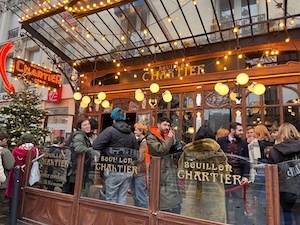
January 2023 – Amber Everywhere , American traveler: “Tourism seems to be back to normal in Paris, with large crowds in many of the most popular parts of the city. You’ll see masks and social distancing in some spaces, but most places are crowded and maskless.
Testing appears to be widely available in Paris, with some visible testing tents throughout the city. There does not appear to be contact tracing in place, at least for crowded public spaces; locals did not mention any trouble accessing healthcare. Most local attractions appeared to be open, same with restaurants and other amenities. I didn’t notice any COVID-related restrictions, though many people chose to wear masks when in public areas (like the metro).”
September 2022 – Alyssa, American traveler: “We arrived in Paris with our two little kids, getting ready to caravan with some friends here in France. So far, I would say Paris is medium to low in terms of crowdedness. Public transit hasn’t been too packed. Everything is open and mask free for the most part.”

June 28, 2022 – Gretchen of Chasing Advntr , U.S. traveler : “We flew to Paris for several days as part of a month long European trip and to celebrate my twins birthday. We walked to all the major sites and while it was crowded, we had no trouble enjoying the attractions. We were glad we booked a river cruise and tickets to Musee D’Orsay in advance as tickets sold out for the river cruise and the museum line was at least an hour wait.
There were very few people wearing masks and maintaining social distance. Lines were long at the major attractions, but we never waited long for a table to eat. We also experienced a partial train strike which added to the difficulty of getting to the airport on already busy trains. Give yourself plenty of extra time to get to the airport.”
May 2022 – Mike C., American traveler: “Travel in Paris was pretty relaxed. There’s no more green pass or need to show vaccine card. Technically there were some rules on public transit to wear a mask. But it felt more like a choice as it was 50/50 on who did and didn’t. Transit was literally the only place with masking in Paris. Crowds felt like Paris is back to normal.”

March 9, 2022 – Erica of Nice French Things, French resident: “It’s the perfect time to visit Paris. Lines are short (or nonexistent) and monuments and tourist attractions are under capacity. Asian tourists have not returned yet and other Europeans are visiting their own countries they haven’t seen in the past 2 years.
Testing and tracing has been perfected here. Our vaccine pass will stop being required on Monday so we will be free to go to museums, theaters, restaurants without showing pass and we will not be required to wear masks. Pharmacies are the go-to for everything. Easy, fast, cheap tests done there. Paris area just reduced price permanently on regional rail tickets. Very advantageous for visitors.”
February 15, 2022 – Ingrid of Second Half Travels , U.S. traveler: “I’m spending 5 weeks in Paris and Montpellier currently studying French. COVID case numbers are dropping steeply in France. However, tourism numbers in February are still very low, so it’s a great time to visit to enjoy uncrowded museums and other sights.
My flight from Dallas to Paris in February was almost empty. I had a whole row of 9 seats to myself. Rapid and PCR tests are readily available at French pharmacies. It was easy and quick to get my Pass Vaccinal at an airport pharmacy when I arrived for 36 euros; I just showed my CDC vaccination proof of my vaccines and booster.
The Pass Vaccinal is supposed to be checked at all restaurants, museums, and long-distance trains. In practice, restaurants and trains sometimes fail to check. The Louvre and Musée d’Orsay in Paris were uncrowded: no large tour groups, only individual tourists from neighboring European countries like Spain. A Parisian friend told me, ‘You will never see Paris uncrowded like this again.’ I have actually extended my trip to add on more days in Paris to take advantage of this unique opportunity.”
October 23, 2021 – Jennifer A., American tourist: “ We had a fantastic time. We were very careful the entire week we were in Paris. Wore our masks everywhere and washed our hands a lot. Instead of doing two or three things in a day, we just did one major tourist thing each day. To be honest, that made the trip more enjoyable. We used the Paris Museum Pass and that was great. I ordered the five day passes and they mailed them to me last month. A couple of the museums required us to book a time slot to get in. I was of course concerned about passing a COVID test 72 hours prior to returning to the U.S. My sister and I walked about 500 feet from our hotel to a pharmacy to take the COVID test. The cost was 25 Euros for each one of us. The gentleman in the pharmacy was so professional. We also received our results via email in about 30 minutes. Unbelievable. We were able to upload the COVID results to a VERIFLY app that American Airlines wanted us to use. It made things a lot easier to go home. The French residents were all so nice to us. I am so glad we went.”
October 6, 2021 – Nick Winder, Illness To Ultra , American digital nomad: “I flew to Paris in order to transit to the south of France to visit family. Although there are still people visiting Paris, it’s obvious the tourist rates are reduced. Locals are more than welcoming, but the requirement of a health pass, even for foreign visitors proves challenge for both tourists, and local business owners. Nearly every local was compliant with city regulations, which is a must, especially considering public transport can still be busy. Access to testing and healthcare is abundant among pharmacies, although Sundays many pharmacies are closed. Most local attractions still remain open, although at a reduced capacity, but the reduced tourist level lines are not much of a problem. Just be aware that many attractions are ticketed.”
September 13, 2021 – Susan, US traveler: “ We’ve been in Paris almost 2 weeks finding it somewhat changed in several ways. We read that you can get the Passe Sanitiaire at pharmacies, yet, we’ve gone to more than I can count always being told that pharmacies are not providing them. At one yesterday, the owner said he believes that people were getting antigen tests at the pharmacy which gives a 72-hour Passe Sanitiaire. Tourists are few especially Americans. Some stores are permanently closed in touristy areas while nothing has changed in our neighborhood that is more residents of Paris.”
November 2021 – Roobens, French citizen in Paris, Been Around the Globe : “Everything reopened in May (bars, restaurants, gyms, clubs, etc.) in France. Meaning life is more or less back to normal. You just need to have a health pass to prove you’re fully vaccinated. And you have to wear a mask indoors (at the supermarket, when taking the metro, etc.). People are more than ready to travel in Europe only right now. Outside Europe it’s a different story since many borders are still closed. It’s very easy to get tested and to get vaccinated. There’s also an app for contact tracing, most people use it (it’s called “AntiCovid”). Everything is open (museums, restaurants, tourist attractions, etc.).”
September 2021 – Susan, traveling to Paris from US: “My husband and I flew to Paris in August-September 2021 for a 3 week visit with my daughter who lives there as a digital nomad. Tourists are very welcome if fully vaccinated. Major tourist attractions were uncrowded, though online ticket purchases are still recommended. Restaurants were full, especially the venues with large outdoor seating areas. (Travelers should be aware that diners frequently smoke in the outdoor areas.) Nevertheless, this may have been the best time in recent years to be in Paris, due to small crowd size. Paris was very ready to serve customers in the time of Covid. The French population is >70% vaccinated and the digital vaccine passport works well for French residents (but not visitors). Visitors should bring their original vaccine card to get on the airplane, but a laminated photocopy worked well at every location.
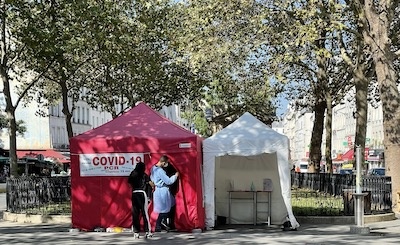
A vaccine card (or proof of a negative Covid test within 72 hours) was required at every.single.sit-down eating establishment, hotel, museum, or major tourist destination. Proof was not required to ride public transportation.
Surgical (not cloth) masks are required in every indoor space. Indoor mask-wearing was being strictly followed, with an occasional scofflaw in the subways. Compliance was certainly better than most places in the US. Almost all restaurants had outdoor patio seating available, though the desirability of this may change as the weather cools. Take-out businesses and park-bench dining were thriving. I did not see evidence that contact tracing (in restaurants) was happening. There are Covid testing tents in most busy squares, but many are not accessible to non-residents because they don’t have the ability to charge the required fee there. Covid testing (required for return to the US, and elsewhere) can be done in pharmacies and labs. Your hotel desk may help you find a location. Caution – our results did not arrive via text, as promised, probably because we didn’t have a French phone number. We ended up waiting in a very slow line at the lab to get the results.”

August 30, 2021 – Melissa Suzuno , U.S. visitor: “I’m spending a week in Paris in late August/early September 2021 and my trip is just for fun but as a freelance writer, I’m also doing some work here. I’m not sure if I’d really describe Parisians as “welcoming,” (haha) but tourism is alive and well in Paris. I did an Airbnb Experience and about half of the participants were French and half were American. The guide said that the number of Americans had decreased for a while but seems to be bouncing back. There are restrictions in place and they seem to be followed quite consistently. For example, you need to show your health pass (or recent negative COVID test) to eat in a restaurant (even outside) or enter a museum. Everywhere I’ve gone has enforced this. Local attractions like museums are open, but they recommend (and sometimes require) you to reserve your time in advance. I’ve gotten a few tests since I’ve been here (to get the temporary health pass). Tests are available in nearly any pharmacy and cost around 30 euros.”
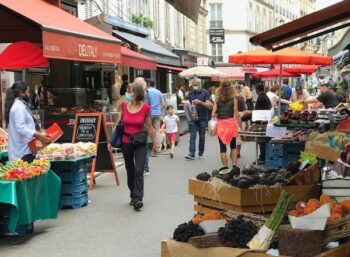
June 2021 – Leyla, Offbeat France , French resident: “I took a walking tour in the Marais a few days ago and we had one American tourist – the guide said it was her first of the season. Most tourists are French or European in Paris, but with the lockdown now lifted, a few Americans are beginning to arrive. In Paris, I’d say about 90% of people are following the rules. There is the occasional person who doesn’t cover their face in the subway or bus but they do get sideways looks from others. Everyone is masked in shops, because the owners will get fined otherwise. There’s usually plenty of gel at the door or at the cash register. In the streets, quite a few people still wear masks, considering that they are no longer mandatory. As the hot weather moves in, there will probably be fewer masks in the streets. The attached photo shows people do occasionally wear masks outdoors.”

June 2021 – Lena, Salut from Paris , French resident: “ Paris experienced a collective sigh in relief during the past weeks and enjoys the pure presence of normality – and travelers clearly belong to this normality. Just a couple of weeks ago, the obligation to wear masks outdoors got lifted. Indoors, it is still mandatory and the vast majority is complying. Food services and attractions are open again. However, while the online booking service of attractions assures that the number of visitors is not exceeded, I observe often that bars and restaurants are way fuller than they should be. It is recommended in France that everyone, locals and travelers, are downloading the app #tousanticovid for tracing and alerts. If a visitor requires a covid test, they can easily get tested in pharmacies.”
May 2021 – Audrey, French Resident in Lyon: “Since May 19, the curfew is now starting at 9:00 pm. Restaurants (only outdoor dining), boutiques, movie theatres, museums… have re-opened, only accepting half of the possible guests (which means you need to book everything or wait long lines on the sidewalk). Travel between regions is fully allowed before curfew and after if you’re filing an exemption form (if your train or flight arrives at 9:30 pm for example). All French people over 50 are being vaccinated. Our next milestones are the following: – May 31: opening of vaccination to everyone – June 9: opening of indoor dining and more people allowed in boutiques and such. Of course, wearing a mask is still mandatory everywhere public, inside and out.”
Planning a trip to Paris France?
Check out our other Paris, France travel resources: – Preparing for a Budget Trip to France – Where to Stay in Paris France: Best Neighborhoods Hotels Airbnbs – Travel Seasons: The Best Time to Visit Europe
If you have questions or updates about travel to Paris, France during the Coronavirus crisis or post-pandemic, please let us know in the comments below.
~ Pin this post for later or share with friends ~
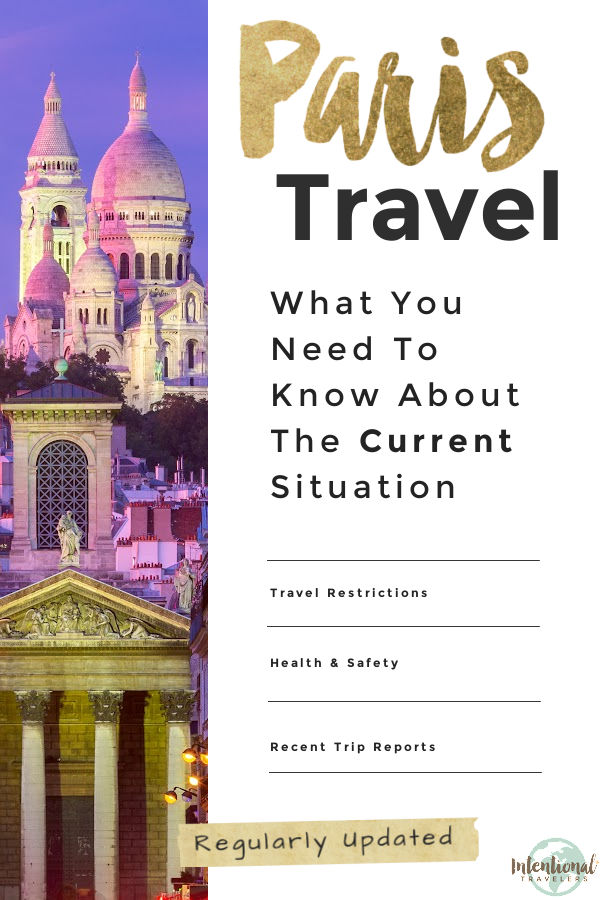
Disclaimer: Please note, travel restrictions change frequently. Readers must take responsibility for verifying information through official sources like the State Department and CDC, in respect to their specific situations. No responsibility can be accepted by Intentional Travelers for action or inaction as a result of information provided through IntentionalTravelers.com. Any information provided here is issued as general information only.
Similar Posts

Philippines travel requirements 2024: What travelers need to know
We aim to keep this post updated about Philippines travel in 2024 with official Philippines travel restrictions, requirements, and health and safety guidance. Our goal is to help you make informed decisions so you can travel confidently, safely, and responsibly in this new post-pandemic world of ours. As restrictions can vary based on the traveler’s…
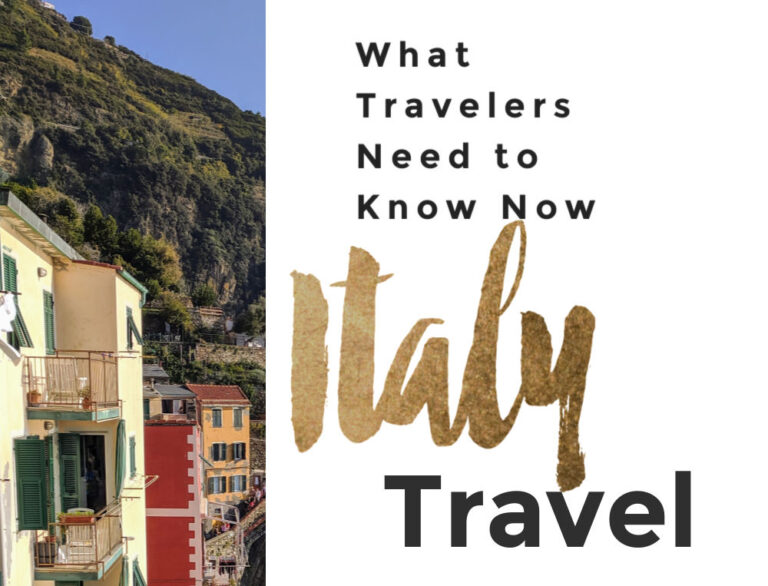
Italy travel requirements 2024: What travelers need to know
We aim to keep this post updated about Italy travel in 2024 with official Italy travel restrictions, requirements, and health and safety guidance. Our goal is to help you make informed decisions so you can travel confidently, safely, and responsibly in this new post-pandemic world of ours. Italy has a special place in our hearts,…

Lisbon Portugal travel requirements 2024: What travelers need to know
We aim to keep this post updated about Lisbon travel in 2024 with official Portugal travel restrictions, requirements, and health and safety guidance. Our goal is to help you make informed decisions so you can travel confidently, safely, and responsibly in this new post-pandemic world of ours. As restrictions vary based on the traveler’s citizenship,…

Thailand travel requirements 2024: What travelers need to know
We aim to keep this post updated about Thailand travel in 2024 with official Thailand travel restrictions, requirements, and health and safety guidance. Our goal is to help you make informed decisions so you can travel confidently, safely, and responsibly in this new post-pandemic world of ours. Since travel restrictions can vary by citizenship, we…

Ecuador travel requirements 2024: What travelers need to know
We aim to keep this post updated about Ecuador travel in 2024 with official Ecuador travel restrictions, requirements, and health and safety guidance. Our goal is to help you make informed decisions so you can travel confidently, safely, and responsibly in this new post-pandemic world of ours. We stayed in Cuenca, Ecuador in 2022 and…

Japan travel requirements 2024: What travelers need to know
We aim to keep this post updated about Japan travel in 2024 with official Japan travel restrictions, requirements, and health and safety guidance. Our goal is to help you make informed decisions so you can travel confidently, safely, and responsibly in this new post-pandemic world of ours. Since travel restrictions can vary by citizenship, we…
38 Comments
https://www.euronews.com/2022/03/03/covid-in-europe-france-to-scrap-face-masks-and-vaccine-passes-on-14-march
Looks like things may be loosening up by March 14th hopefully
Michelle, I have seen articles with Forbes, euro news & Reuters on the vaccine pass getting scrapped by March 14th in Paris except for in hospitals and on public transportation. Do you have any knowledge of this? Thanks Wendy
Hi Wendy! Thank you for visiting our blog. That information is correct. The French Government has recently announced that effective March 14, the vaccine pass will not be required to enter most businesses such as restaurants, bars, cafes, ski lifts, museums, cinemas and other cultural venues and theme parks. However, proof of vaccination will still be required in hospitals, retirement homes, and health centers.
I am a fully vaccinated/boosted American who will be arriving in Brest, France for one day, May 10, on a cruise ship followed with a one day stop in LeHavre, France on May 12. I’m aware of the French Vaccine Pass but can’t find anything about what is needed for a cruise ship arrival. Any help you can provide will be greatly appreciated.
Hi Susan. The French government does not specify restrictions for cruise ship passengers, therefore, the current entry rules for air travelers may also apply to travelers who want to go ashore in French ports. I understand that you are fully vaccinated/boosted, which is already compliant to France’s entry rules (you can find the details in our blog). Your cruise ship operator may also have information regarding entry rules to France. We will update our blog if the French government releases information regarding cruise ship arrivals. I hope this helps.
I just received this from Eurostar “You are considered fully vaccinated for travel purposes if you are aged 18 and over and: *you received a COVID-19 vaccine booster*
*you received the second dose of a two-dose vaccine at least a week ago, but no more than nine months ago*
So the important word here is “OR”. Sounds like it’s just what you said Michelle…thank you so much!!!
Thanks for following up, Debbi!
The new booster requirement is very confusing to me. I’ve read other articles where it says, if you don’t get a booster “within 9 months of original vaccine” then you’re considered unvaccinated.
I’m hoping you or someone you know can confirm this. My vaccination dates are as follows: Moderna – 4/5/2021 Moderna – 5/3/2021 Moderna Booster – 2/12/2022
Traveling at the end of March 2022 – As of now, will I be considered fully vaccinated and allowed to enter France? Or did I get the booster too late?
Thank you. Your article is very helpful!
Hi Katherine. We acknowledge that this requirement has been confusing. The way the official rule was translated in English makes it sound like the booster must be done *within* a certain timeframe. However, an expiration like this would be highly impractical and, in fact, most reporting on the requirement say more clearly: “Travelers aged 18 and over who had their full vaccine course over 9 months ago and have not since received a COVID-19 vaccine booster must follow the rules for unvaccinated passengers to enter France.” We have been researching this closely and have not seen any evidence of travelers being denied for a “late” booster, nor does France ever mention needing a second booster. We are keeping a close eye on this and will share any updates as they become available.
Thank you so much for your reply! I will keep a close eye on your page for any other updates.
Hello Michelle,
I am confused about the new protocol in France re: vaccinations and boosters. If I had my 2 vaccinations last Feb and March 2021 and then my booster 6 months later, am I considered “fully vaccinated”? Also, my adult son had his 2 vaccinations, the second being May 6th. He has not yet had his booster. I am reading that there is a 9 month expiration of his initial vaccinations so as of Feb 6 (3 days ago) he can no longer be considered “fully vaccinated” even if he gets his booster immediately?
Debbi, I hear you. This particular requirement can certainly be confusing, not to mention constantly changing. The way France has written the booster rule (“no later than nine months following the injection of the last required dose”) makes it sound like the booster must be done *within* 9 months of the second dose to enter France (or soon to be 4 months for the vaccine pass to enter restaurants). However, an expiration like this seems highly impractical and, in fact, most reporting on the requirement say more clearly: “Travelers aged 18 and over who had their full vaccine course over 9 months ago and have not since received a COVID-19 vaccine booster must follow the rules for unvaccinated passengers to enter France.” This would indicate that your son can be considered fully vaccinated once he gets a booster, even if the booster is done after 9 months. I’m assuming it’s just a translation/wording problem because I have not seen anywhere that travelers with “late” booster doses would lose any chance of being considered fully vaccinated. We are keeping a close eye on this and will share any updates as they become available.
Boosters every 4 months??! Wow
Yes, it seems to be the case. Like so many protocols, though, it could very well change.
I have a trip planned to Paris March 18,2022. I am reading that everyone needs to have the booster shot after being vaccinated for 4 months or you will not get the Vaccine Pass. Do you know if this rule is also mandatory for people going to France from the US? Some articles I have read say it is mandatory and others say it is not. Do you happen to know?
Thanks for your question Susie. I think part of the confusion is that the rules have changed recently. The following update is directly from the French government website in regards to foreigners vaccinated outside of France: “Since the 15th of January 2022, people aged 18 years and 1 month or more and who completed their initial vaccination scheme more than 7 months ago will need to present a proof of a booster dose to be eligible to receive a vaccine equivalency health pass.” I’m not sure why this site does not list the change to a 4 month rule that reportedly goes into effect in February. Perhaps confirmation is still forthcoming.
I am fully vaccinated. I had my booster in Dec. of 2021. I am going to France in June 2022, 6 months after my booster. Do I need a second booster in order to get in the country, or the receive the Health Certificate to allow me into restaurants and museums?
Hi Rebecca. We acknowledge that this requirement has been confusing. The way the official rule was translated in English makes it sound like the booster must be done *within* a certain timeframe. However, an expiration like this would be highly impractical and, in fact, most reporting on the requirement say more clearly: “Travelers aged 18 and over who had their full vaccine course over 9 months ago and have not since received a COVID-19 vaccine booster must follow the rules for unvaccinated passengers to enter France.” We have been researching this closely and have not seen any evidence of travelers being denied for a “late” booster, nor does France ever mention needing a second booster at this time. If you are boosted, you meet the current requirements to enter France and to receive the vaccine certificate. We are keeping a close eye on this and will share any updates as they become available.
I am wanting to plan a trip to take my 14 yr old daughter to Paris the last week of March 2022 on her spring break. I am fully vaccinated, but she is not. She has lab proof of antibodies – also sadly I’m being treated for a blood clot from my Covid vaccine which leads to my hesitation to vaccinate her. All of that aside- I see the paragraph that says travelers ages 11-17 are considered vaccinated if traveling with a fully vaccinated parent (I understand we would both need negative Covid test as well) I have read multiple other sites and I’ve seen this same info but have also seen on other sites everyone 12 & older must be vaccinated unless they’re going to quarantine for 10 days. Do you know what the policy is on this as we do not have 10 days to quarantine. IF she is able to come & not quarantine what would we do to get her a health pass or QR code to enter tourist sites? These are questions I cannot seem to clear up & I want to be sure before I would plan this. I am willing to email or call to France if I had the appropriate number and email contact. I’ve already sent an email a week ago through a government site and still do not have a response. Thank you in advance for any help/info you may have.
Thank you for visiting our blog. Current France travel rules states that “The measures applicable to fully vaccinated adults will be extended under the same conditions to minors accompanying them, regardless of vaccination status.” Since you are vaccinated, your 14-year-old daughter will be treated as vaccinated as well and will not need to quarantine. A negative test is however required for all travelers aged 12 and over. You can check the U.S. Embassy in France or the France Diplomacy websites for more information.
Regarding the health pass, persons age 12-15 require a health pass everywhere a vaccine pass is required. You can obtain a vaccine pass (or a health pass for your daughter) from designated pharmacies in France for a fee of up to 36 Euros (approximately 41.18 USD). You can check here for the map of designated pharmacies in France. You can check our blog for more information about the health pass and regular updates about France’s travel requirements. Hope this helps.
Thank you for your reply. As far as the health pass goes for my 14 yr old daughter, since she is not vaccinated am I understanding that in order for her to obtain one from the French pharmacies she will have to pass a Covid test every 24 hrs. for a fee of 36 euros each time to keep it active in order to be admitted into restaurants, museums, etc.? I have clicked on the map of pharmacies to actually check with one but everything on that page is in French. I am just making sure I understand this. Thank you
Wendy, an unvaccinated 14 year old would need a test within 24 hours in order to enter restaurants, attractions, and long-distance travel. She would not need to test daily unless you are visiting places where the pass is required each day. Antigen tests are 25 euros (36 was for the vaccine equivalent, sorry for the confusion). Here is a more direct link to pharmacy testing location map, you just have to keep clicking to zoom in on Paris: https://www.sante.fr/cf/carte-depistage-covid.html
Excellent information! Merci! It is January in the US right now and we are planning our trip to Paris for mid April 20 22 very excited but also so concerned because of the omicron variant now. I will follow your blog and see if any new postings are out as January comes to an end I am getting ready to book our trip now. Thanks again so much.
Great blog! Thanks for sharing paris travel restrictions, really helpful content.
I am planning a trip to Paris September 22 through 29th with a one day bus trip to Normandy. I understand that since I have a CDC proof of vaccination I do not need a test to enter France. However I do need a Travel Pass which would be obtained at a Pharmacy. I had read that the French government was paying for tests in order for tourists to return to their country of origin but not sure that is correct. My main question, does this process of receiving the Travel Pass work “smooth” or could there be snags. Same question for the required Covid-19 test upon returning, are there ample Pharmacy and testing sites for tourists? Has anyone taken a survey of recent travelers? Thank you
Thanks for visiting our blog. The French health pass for non-EU citizens is still relatively new and the protocols for visitors in September don’t seem to be fully established yet. Official guidance can be found here . At the moment, visitors coming before August 18 are able to submit their proof of vaccination by email before arrival to get the pass (a QR code). In case it’s not processed in time, getting tested in France is a temporary “back-up” method, valid for 72 hours. I’ve also seen that some travelers have been able to show their CDC vaccine card at a pharmacy in Paris to receive a QR code within 15 minutes, but I’m not sure how common that is yet. We will continue to seek out on-the-ground reports from recent travelers to find out how it’s going, and we’ll regularly update this post as we learn more.
We are scheduled to arrive Paris September 7, cruise to Normandy from the 9th through 16th, spend two more days in Paris, returning to U.S. on the 18th. The CDC and State Department alerts say “do not travel” and also warn about demonstrations and violence in tourist areas of major cities. We are in our 70s, fully vaccinated, but also cancer survivors. Should we cancel our trip?
I understand your concern. It’s a question I’ve been getting a lot lately with all the uncertainty around Europe travel so I wrote an article about it here: https://intentionaltravelers.com/should-i-reschedule-my-trip/ There is no right answer, as it depends on your values and risk tolerance, so I can’t really make that call for you. Demonstrations in Paris are certainly an additional factor to consider. But just to give some perspective… I’ve never been to Paris when there *wasn’t* a demonstration going by on my Uncle’s street, although they can vary in intensity. Usually protest locations are known so they can be avoided. However, if potentially dealing with that sounds too stressful, it may be a reason to cancel. Being fully vaccinated makes a huge difference but even so, cruising and travel in France during the pandemic is not without risk. Does the benefit of this trip outweigh that risk? Will worry get in the way of your enjoyment? That’s up to you.
Is there an app to use to show proof of vaccine status for visitors from outside the EU?
Thanks for your question. The E.U. vaccine app is only available to citizens and residents of the EU so far. Whether this will eventually be made available for non-EU tourists to facilitate travel in Europe is not yet clear, but we’ll be sure to update our blog posts here if that changes.
I am a US citizen planning a trip from USA to London and then to Paris. Is there any rules for US citizen traveling to Paris, via London by train?
Good question. Traveling through some countries to France can complicate the requirements. Whereas the U.S. is on the “green list”, the U.K. is on the “amber list” for France and the rules for the UK would apply since that’s where you’ll be departing from to enter France. Fully vaccinated travelers can enter France without an essential reason and would need to present a recent negative Covid test and proof of vaccination status. More details can be found here: https://www.diplomatie.gouv.fr/en/coming-to-france/coronavirus-advice-for-foreign-nationals-in-france/#sommaire_1
Hi Michelle,
It looks like France is no longer requiring a negative PCR test for vaccinated travelers from “Green” countries (the US included).
Or is it? Later on that page it states “(if you are aged 11 years or older) you agree to submit to a virological RT-PCR test for SARS-CoV-2 upon arrival in France.”
What are your thoughts?
Hi Ben. Thank you for visiting our blog. It is correct that France is no longer requiring a negative PCR test for fully vaccinated travelers from the United States and other Green countries. If a traveler (aged 11 years or older) from Green countries is not fully vaccinated, then a negative PCR or antigen test is required. A negative PCR or antigen test is also required for allowed travelers coming from “Orange” and “Red” countries.
A quick update from France: Since May 19, the curfew is now starting at 9:00 pm. Restaurants (only outdoor dining), boutiques, movie theatres, museums… have re-opened, only accepting half of the possible guests (which means you need to book everything or wait long lines on the sidewalk). Travel between regions is fully allowed before curfew and after if you’re filing an exemption form (if your train or flight arrives at 9:30 pm for example). All French people over 50 are being vaccinated. Our next milestones are the following: – May 31: opening of vaccination to everyone – June 9: opening of indoor dining and more people allowed in boutiques and such. Of course, wearing a mask is still mandatory everywhere public, inside and out.
Hi! Thanks so much for sharing these updates from France!
I have friends in Paris and I’m thinking about going next month…. Will the restrictions ease by then?
Hello and thank you for visiting our blog. I understand your concern about your trip next month, though we don’t have any special insight as to when protocols might change, beyond what we’ve already shared in the article. We will do our best to keep updating this post as the situation progresses.
Leave a Reply Cancel reply
Your email address will not be published. Required fields are marked *
This site uses Akismet to reduce spam. Learn how your comment data is processed .
We’re sorry, this site is currently experiencing technical difficulties. Please try again in a few moments. Exception: request blocked
France is open to Americans; Here's what it's like now and when to go

France reopened to international tourists , including vaccinated Americans, on Jun. 9, 2021. I covered the entry process last week and have been in France ever since, staying mostly in Paris.
I've gotten countless emails since publishing the entry article, most with one common theme: Is it worth visiting Paris right now? And the question makes sense since France has many coronavirus restrictions in place through the end of the month.
While I wish I could say that your Paris trip will look the same as in years past, that simply isn't the case. In fact, Paris isn't as open as many American cities like New York or Chicago . But, plenty of the city's charm is still there, and many of its strict lockdown measures have been eased.
Here, I'll discuss what you can do in Paris during the current phase of coronavirus restrictions.
Let's take a look!
For more TPG news delivered each morning to your inbox, sign up for our free daily newsletter .
Current COVID-19 restrictions in Paris
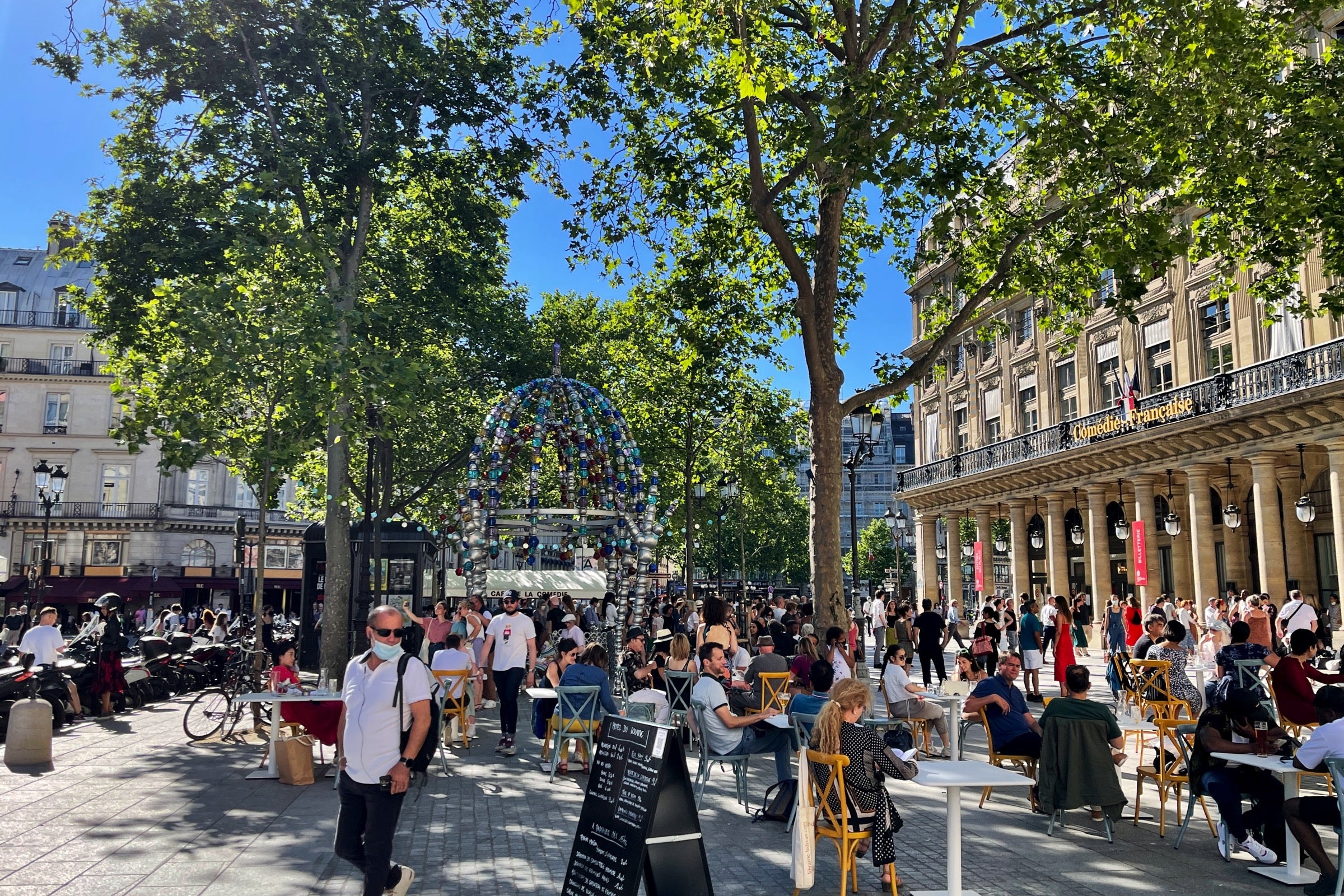
Let's start with the bad news: There are still some strict COVID-19 restrictions in effect in Paris (and France as a whole). Here's a closer look at what these restrictions are and how they can affect your Paris vacation.
There's an 11 p.m. curfew throughout France
One of the biggest drawbacks to visiting Paris (or France) right now is the 11 p.m. curfew. Everyone — including tourists — are required to be in their home or hotel room between 11 p.m. and 6 a.m. every day. There is a 135 euro fine for evading this curfew that's strictly enforced throughout Paris.
That said, don't fret if you have an early flight or train to catch. There are plenty of exceptions to the curfew and you can get an electronic exemption slip online.
Many restaurants in Paris are operating past 11 p.m. but without seating. You can order delivery from popular apps like Uber Eats and Deliveroo. Likewise, many hotels continue room service past the curfew, so you won't go hungry if you need dinner or want a midnight snack.
This curfew is expected to be lifted on June 20 if case counts continue to trend downward. So with that in mind, you might want to postpone your trip until next month if you're a night-owl.
Related: The 11 hotel breakfasts we'd order for every meal if we could
Most things operate at a reduced capacity
Now for the good news: Pretty much everything is open in Paris. That said, everything is open at a limited capacity, so you'll want to make reservations for restaurants and museums. Most museums have online reservations while restaurants usually require you to call in for a reservation, but I've had no issue walking into most cafes and bistros.
Related: 15 things to see and do on your first trip to Paris
You'll need a health pass for large events
The French government notes that a digital Health Pass is required for all large events in France. Generally, this is for events with more than 1,000 people. This includes open-air venues, theaters and stadiums, so you'll likely need this for concerts and sporting events when they restart.
You can download the TousAntiCOVID app from the App Store or Google Play to set up your pass. This pass shows vaccination status or a recent negative COVID test, but I haven't had any luck adding my CDC-issued vaccine card to the app yet. Thankfully I haven't needed a Health Pass thus far on the trip. If you need it for an event, you may need to get a negative COVID-19 test in France.
Related: Your guide to vaccine passports
Yes, masks are still required
Masks are still required in France. You must wear a mask at all indoor venues, including shops, cafes and restaurants. That said, you can take your mask off when eating or drinking. In practice, most locals aren't wearing masks once seated at any type of dining establishment.
Related: Masks still required during air travel as CDC loosens indoor mask guidelines for fully vaccinated people
Getting around Paris (and France)
Transportation in and around Paris (and France as a whole) is largely operating as normal. Here's my experience getting around the city.
The Paris Metro is running as normal
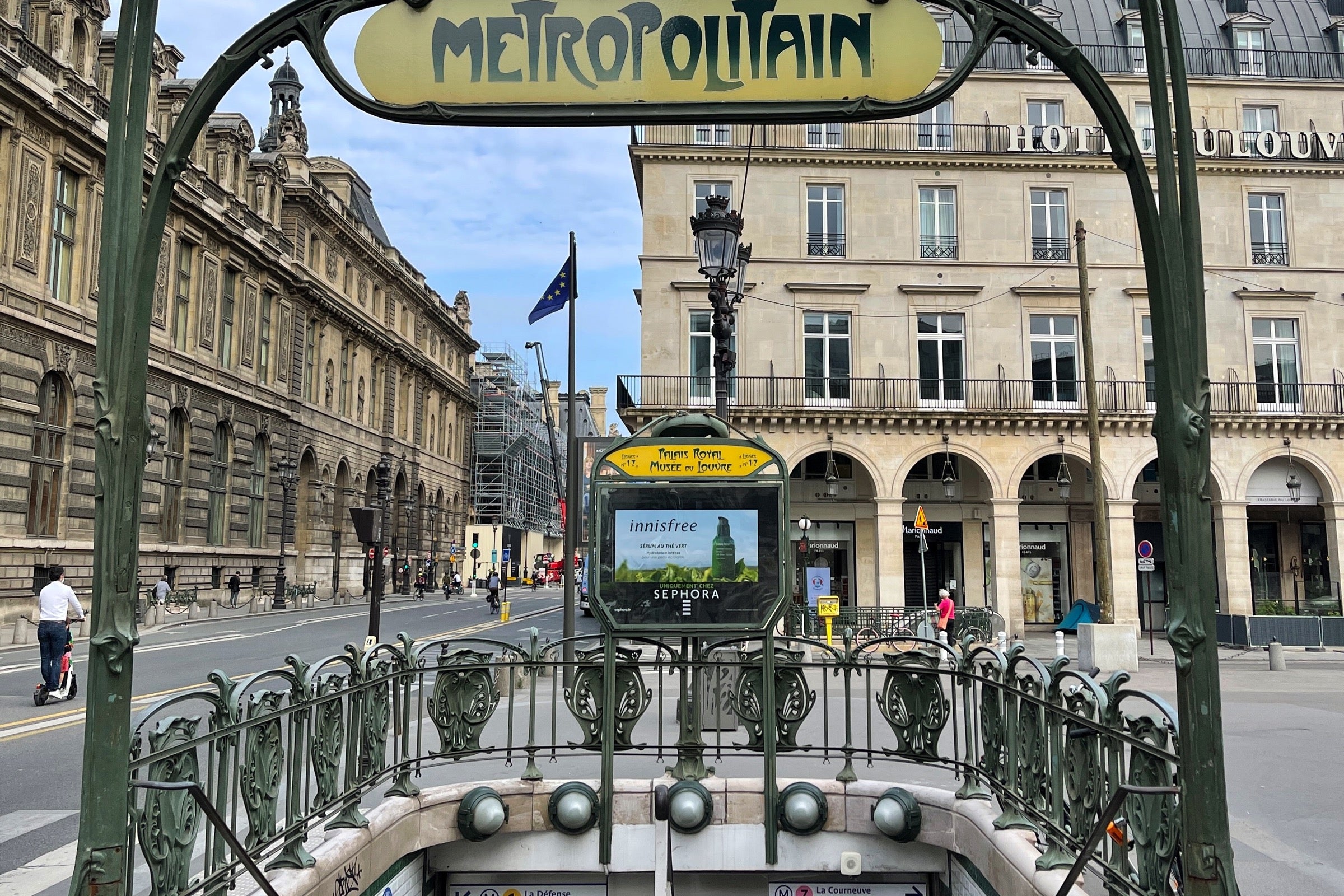
I've used the Paris Metro for the majority of my trips around town. It's operating as normal and on time. You'll find that many Metro cars are packed during peak times, so avoid rush hour if you're not into crowds. You can still purchase Metro tickets at all stations and take the RER train from Paris (CDG) to the city center.
Related: 10 things no one tells you about… Paris
National trains are still available

Headed to Nice, Bordeaux or another part of France after Paris? Don't fret — the SNCF is running trains all over the country. I took the train from Paris to Nice earlier this week and it was on time with zero issues. Just note that there are no blocked middle seats or other precautions taken, so you may want to rent a car or purchase a first-class ticket to avoid crowds.
Related: Tips for train travel and transportation in France
There's an Uber shortage, so download Bolt too
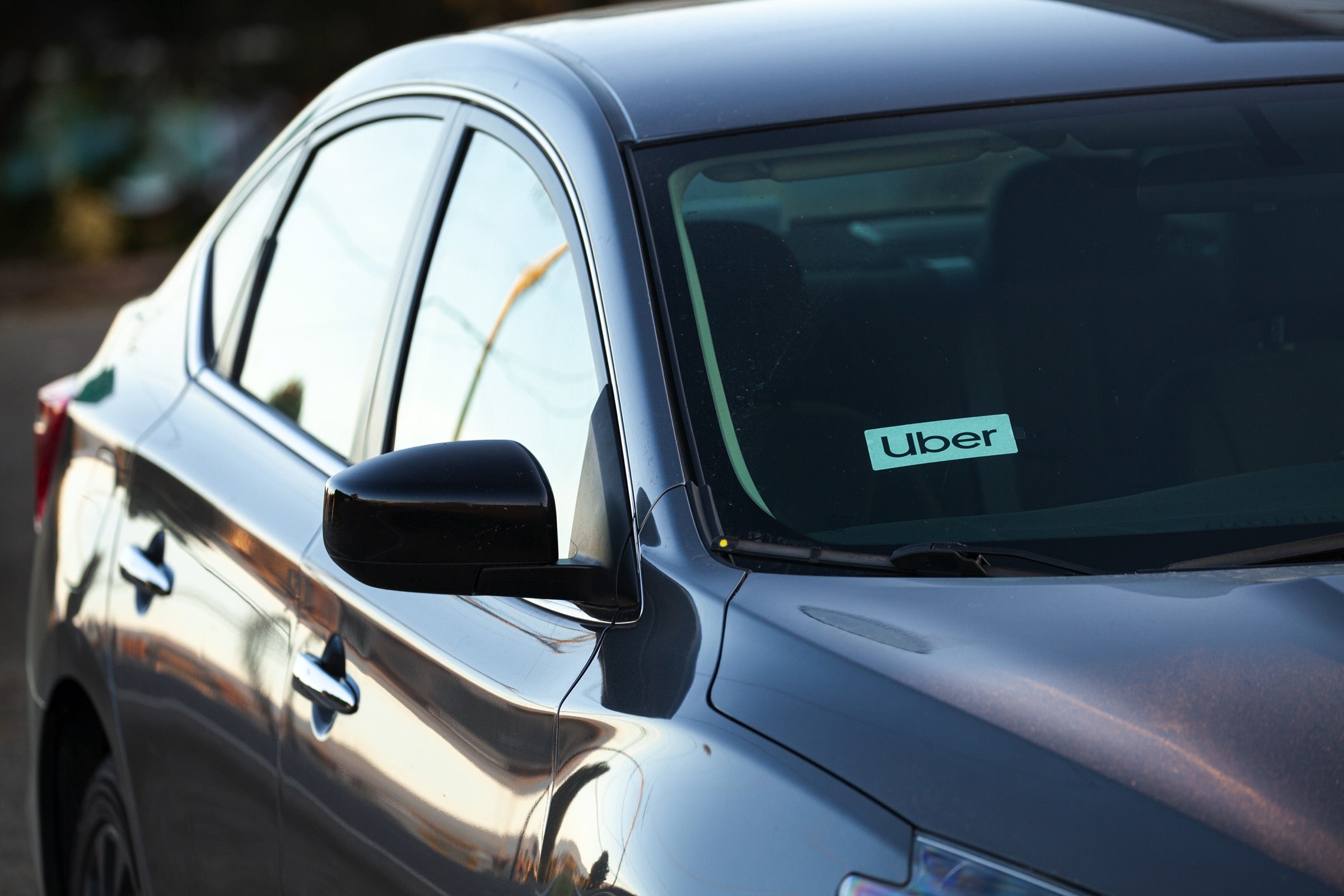
Like in many U.S. cities , there's an Uber shortage in Paris. Prices are high and it often takes 10+ minutes to find a ride if you're in the city center. I highly recommend downloading a European rideshare app like FreeNow or Bolt to use if you can't find an Uber. I've had good luck with Bolt and used it a couple of times during my trip.
Related: An Uber driver talks how to get the VIP treatment and be a better traveler in 2021
What you can do in Paris right now
Despite the restrictions, there is plenty to do in Paris. Here's a look at what you can do, see and eat in the French capital.

Restaurants, cafes, bars and bistros are open
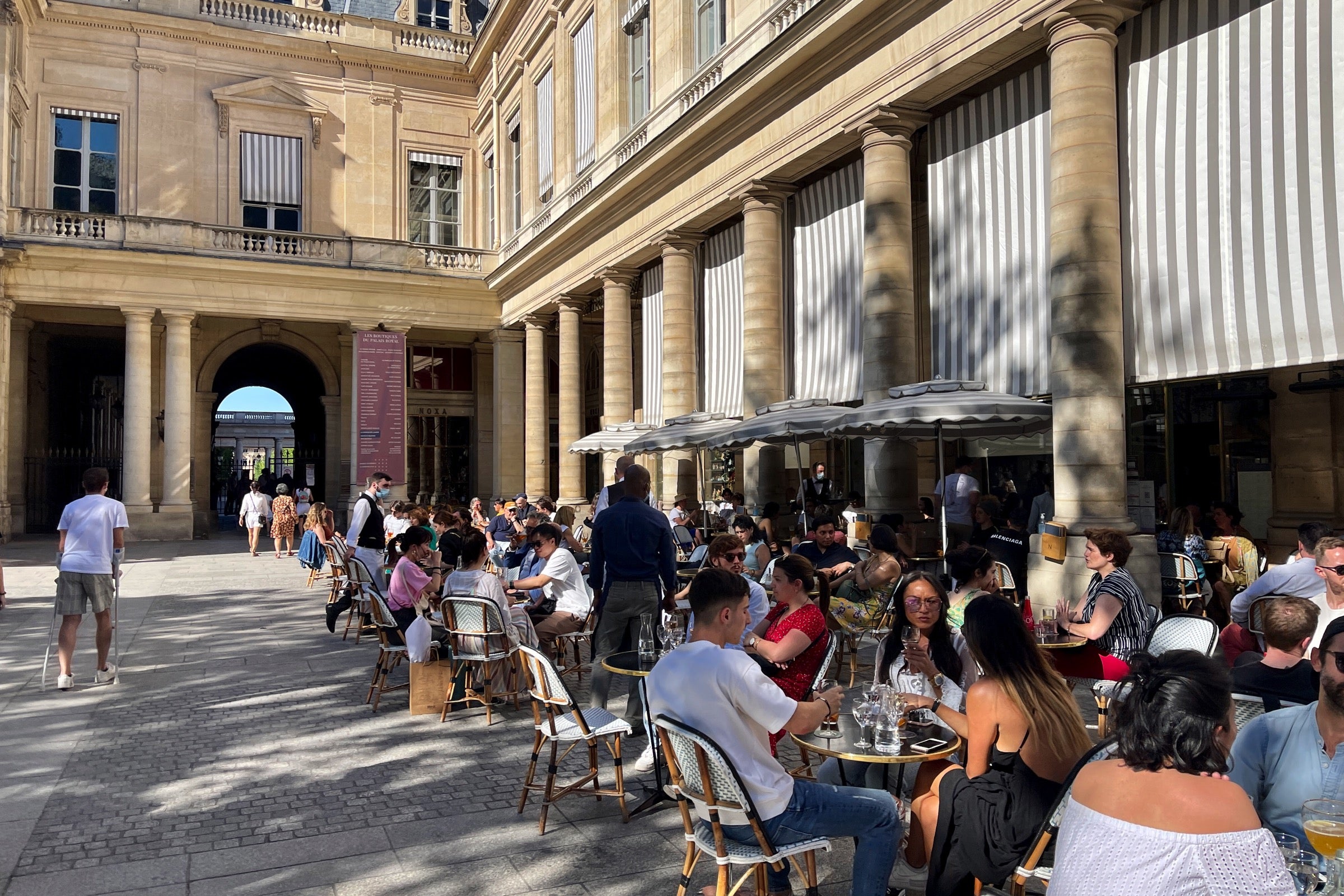
Pretty much all dining establishments are open across Paris. They're allowed to be open at full capacity outdoors and half capacity indoors. Currently, bar seating is prohibited and there is a maximum of six guests per table.
I've noticed that all of these rules are under very limited enforcement, so your experience may vary depending on where you eat and drink. You'll find particularly large crowds at outdoor cafes on Friday nights after work. Midday crowds are about what they were pre-pandemic on cafe patios.
Related: 11 of the most Instagrammable cafés in Paris
Most museums are open, but you'll need a reservation
Museums are open, but with a capacity limit of one visitor per 4 square meters. You need to make a reservation for most museums on their website. I had no issue getting a ticket to the Louvre the weekend before my trip. That said, the Louvre had large crowds around premier exhibits like the Mona Lisa, but mask compliance was strictly enforced.
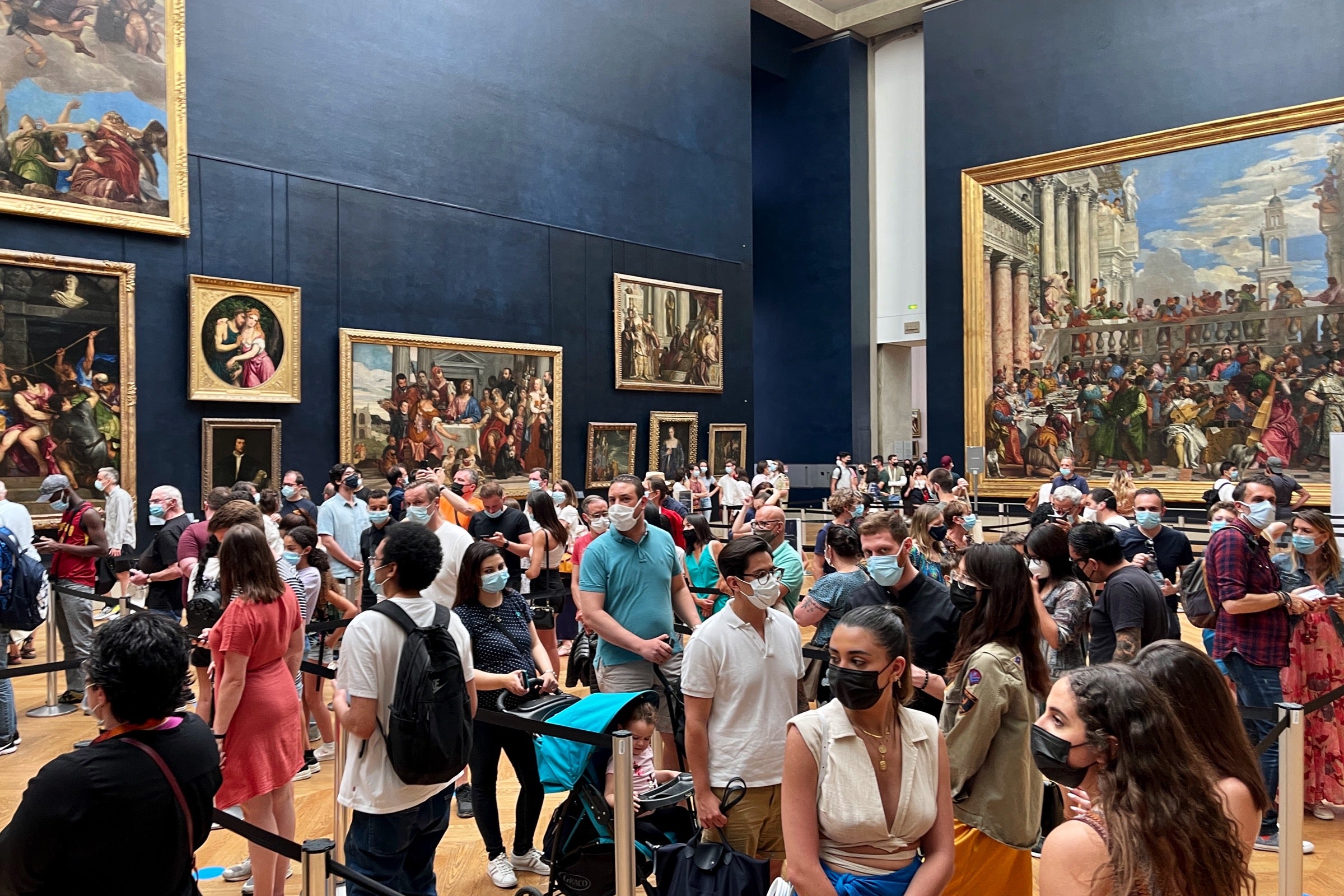
Unfortunately, some famous landmarks like Eiffel Tower remain closed until next month. You can still see them from the outside, but interior tours are still suspended. I'm hopeful that these will reopen on schedule so long as COVID-19 cases continue to trend downward in France.
Related: How to avoid soul-crushing crowds at the Louvre
Shops are operating as normal
Shops are operating as normal until the 11 p.m. curfew. This includes everything from designer clothes stores to the neighborhood grocery store. You'll have no problem getting your shopping fix in Paris.
Related: 8 hot shopping destinations in the world's most fashionable cities
The hotel experience is largely unchanged
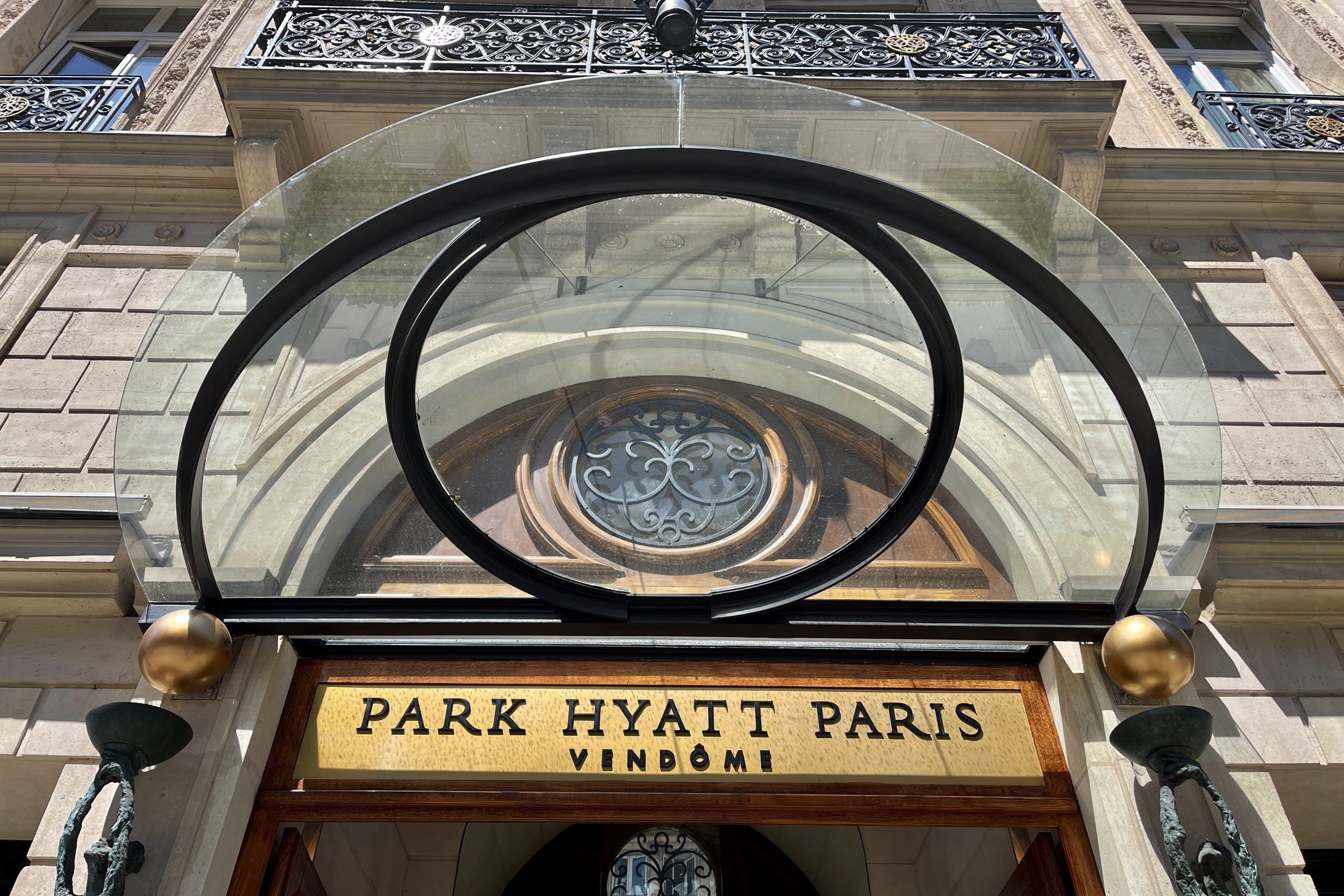
One thing that hasn't changed is the hotel experience in Paris. I stayed at three different hotels during my time in the city and each had open dining facilities, housekeeping and everything you'd expect from a pre-pandemic hotel experience. Just make sure to wear a mask in common areas.
Unlike Iceland , French hotels aren't requiring proof of vaccination at check-in. All you need to do is show your passport and credit card, as usual. This means check-in is quick and easy and you don't have to rustle through your bag to find other paperwork.
Don't worry — you'll hear more about my Paris hotel experiences in two upcoming reviews .
Related: 10 of the best points hotels in France
COVID-19 testing in Paris
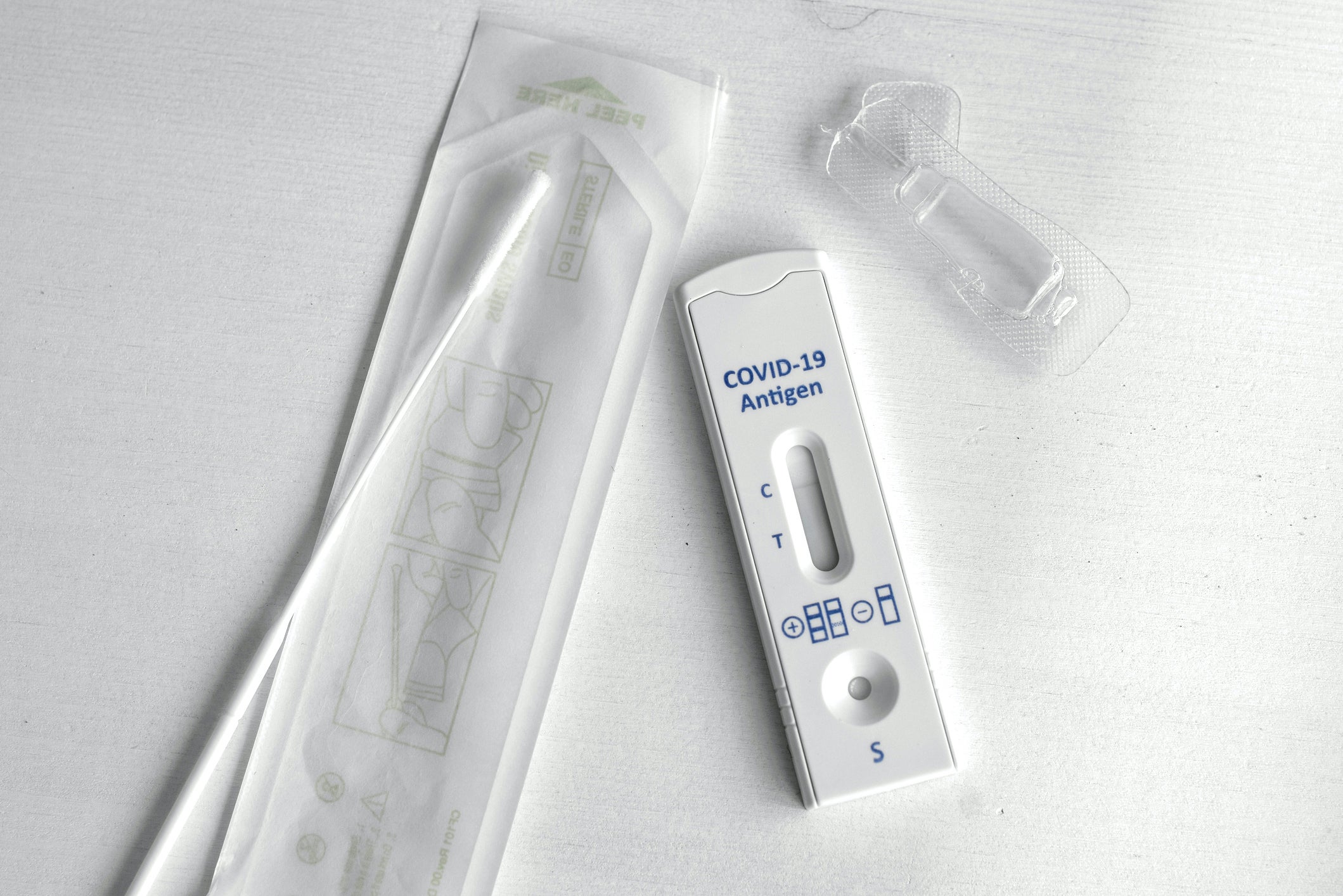
Another thing readers have asked me is where they can get a COVID-19 test in Paris in order to return to the U.S. Truthfully, I'm writing this while still in France, so I haven't been tested for my return yet. But I've done a bit of research and have a good understanding of how to get a test in Paris.
Either a PCR or rapid antigen test are acceptable types of tests for return to the U.S. In my experience, these tests are checked at flight check-in and not at the U.S. border. Your test must be less than 72 hours old to be considered valid.
Antigen tests are relatively easy to come by in Paris. I saw a testing booth set up outside of the Operá Metro stop last week, so you may want to check if you're staying at a nearby hotel (like the Park Hyatt Paris-Vendôme ).
You can also find antigen testing at most pharmacies around Paris and other French cities. Pricing varies, but shouldn't be more than roughly 30 euros for foreigners not covered by French health insurance.
Further, there are testing centers at both Paris-Charles de Gaulle (CDG) and Paris-Orly (ORY) airports. These offer both PCR and antigen tests, with one- to two-hour turnarounds for antigen tests. You may consider getting to the airport early and getting a test before your flight if you can't find a test in town. Check the Paris airport website for more info. An antigen test at the airport costs 20 euros.
Related: Traveling soon? Here's where you can quickly get a COVID-19 PCR test for travel
Bottom line
Traveling to Paris right now gives you a unique opportunity to see the French capital with few tourists. At the same time, the curfew makes it limiting for night-owls. Personally, I'd wait a week and go once some of the remaining restrictions have been lifted.
At the same time, those who decide to make the trip now will have no shortage of things to do and see both in Paris and outside of the city. The Louvre and other famous museums are open and Paris' famous cafes and bistros are waiting to serve you an espresso (or a glass of wine).
Regardless of current restrictions, it's great to see life in the streets of Paris after months of lockdown. I thoroughly enjoyed my time in the city and am excited to return later this year as a part of a larger European itinerary.
Bon voyage!
Feature photo by Andrew Kunesh / The Points Guy
Here are the latest rules for US visitors to Paris, France, plus tips on the best time of year to visit
- I f you're planning a trip to Paris, be aware of COVID-19 restrictions and local advisories.
- Keep reading for important details to know before you arrive in Paris.
- Visit Insider's hub for travel guides, tips, and recommendations .

Paris is easily one of the most popular destinations in the world. As of publishing, traveling to Paris and France from the US is possible, but knowing how to make your entry smooth and seamless before you arrive is essential.
I've made the trip myself and compiled the answers to common traveler questions below that you should consider before arriving in Paris, as well as tips regarding local weather and the best time of year to visit.
What are currently COVID-19 restrictions in Paris?
While COVID-19 travel protocols have shifted slightly over the past few months, one thing remains consistent: Vaccinated travel is the easiest option.
As of February 2022 , France has made it even easier for vaccinated travelers to visit the country by eliminating the need for a pre-arrival COVID-19 test. Instead, vaccinated travelers can simply arrive at the border with a valid passport and vaccination card.
Visitors are also required to fill out a sworn declaration that they are not experiencing COVID-19 symptoms or have had close contact with a confirmed case of COVID-19 prior to leaving for Paris.
Related stories
Non-vaccinated travelers are still required to present a negative pre-departure COVID-19 test, either a PCR test within 72 hours of departure or an antigen (rapid) test within the 48 hours prior to departure, as well as the aforementioned sworn statement. Quarantines are not necessary for vaccinated or unvaccinated travelers unless they test positive within seven days of arrival.
Regardless, make sure you dot the i's and cross the t's ahead of any travels because the website for the US Embassy in France says it requires individuals 18 years and older to have a booster shot of an mRNA vaccine if it's been 9 months or more since your second dose (or a single dose of the Johnson & Johnson vaccine) in order to be considered "fully vaccinated." If you're still within the 9 months, you may still qualify under the two-shot window as long as you were vaccinated at least seven days prior to your departure with a vaccine approved by the European Medicines Agency. Children over 12 must also be vaccinated with at least two doses, while children under 12 are currently exempt from being vaccinated.
Keep in mind that if you're arriving from a country other than the US, your entry requirements might differ. And as new variants continue, the French government may update these requirements. Read more here .
Masks are currently only mandatory on public transportation in France.
When is the best time to visit Paris?
Although the peak tourist season officially ends after summer, the fall is one of the most pleasant times to visit Paris. During the autumn season, temperatures range in the 60s, 70s, and sometimes 80s. Nights are consistently cooler, so you'll want to pack a light jacket to offset that transitional summer or early fall wardrobe.
You can also shop for one: Head to the Louvre and Tuileries district for luxe labels or to Marais for more low-key, vintage trends.
View Insider's comprehensive guide to visiting Paris.
- Main content
Cookies on GOV.UK
We use some essential cookies to make this website work.
We’d like to set additional cookies to understand how you use GOV.UK, remember your settings and improve government services.
We also use cookies set by other sites to help us deliver content from their services.
You have accepted additional cookies. You can change your cookie settings at any time.
You have rejected additional cookies. You can change your cookie settings at any time.
Register to vote Register by 18 June to vote in the General Election on 4 July.
- Passports, travel and living abroad
- Travel abroad
- Foreign travel advice
Warnings and insurance
The Foreign, Commonwealth & Development Office (FCDO) provides advice about risks of travel to help British nationals make informed decisions. Find out more about FCDO travel advice .
Before you travel
No travel can be guaranteed safe. Read all the advice in this guide as well as support for British nationals abroad which includes:
- advice on preparing for travel abroad and reducing risks
- information for women, LGBT and disabled travellers
Follow and contact FCDO travel on Twitter , Facebook and Instagram . You can also sign up to get email notifications when this advice is updated.
Travel insurance
If you choose to travel, research your destinations and get appropriate travel insurance . Insurance should cover your itinerary, planned activities and expenses in an emergency.
Related content
Is this page useful.
- Yes this page is useful
- No this page is not useful
Help us improve GOV.UK
Don’t include personal or financial information like your National Insurance number or credit card details.
To help us improve GOV.UK, we’d like to know more about your visit today. Please fill in this survey (opens in a new tab) .
Covid-19: current information and health measures
Surgical masks (without a valve) are strongly recommended on board our aircraft from the age of 6. However, they may be required on board or at the airport depending on your departing and destination countries. Need to check the travel requirements for your trip, learn about our health measures, or get information about our changeable tickets*? Visit our dedicated pages. * Subject to any change fees and/or fare difference. See the fare conditions of your ticket.
Prepare my trip
Find your next destination on our interactive map.
Learn more about how we're keeping you safe.
Upload your documents for verification before your departure date to save time at the airport
Visit TravelDoc to check which documents you need for your trip.
Modify/Cancel my booking-Flight canceled
Modify your flight under My Bookings, no questions asked.
Visit My Bookings to obtain a voucher.
Ask for a refund under My Bookings or via the online form.
Understand how your voucher works.
You are using an outdated browser. Upgrade your browser today or install Google Chrome Frame to better experience this site.

Routine Vaccines
It’s important to be up to date on recommended routine vaccines prior to travel, including Flu, RSV and COVID-19.

Find a Clinic
Advice for Travelers
Personalized Health Information Tool for Global Travel
Disease Directory
Frequently Asked Questions
CDC Yellow Book
Pre-travel Rapid Evaluation Portal for Patients
Clinician Resources
Research and Surveillance
- Medical Tourism
- Cholera Information for Health Care Professionals
- COVID-19 Travel Information
- Travel Industry Resources

Learn about CDC’s Traveler Genomic Surveillance Program that detects new COVID-19 variants entering the country.

Sign up to get travel notices, clinical updates, & healthy travel tips.
See the full list of Travel Health Notices , including:
Level 2 - Practice Enhanced Precautions
- New Chikungunya in Maldives May 28, 2024
- Global Polio May 23, 2024
- Diphtheria in Guinea April 23, 2024
Level 1 - Practice Usual Precautions
- Oropouche Fever in the Americas June 05, 2024
- Updated Global Measles May 28, 2024
- New Meningococcal Disease in Saudi Arabia - Vaccine Requirements for Travel During the Hajj and Umrah Pilgrimages May 20, 2024
There are no Warning , Alert, Watch, COVID-19 Very High, COVID-19 High, COVID-19 Moderate, COVID-19 Low, COVID-19 Unknown, Level 4, or Level 3 notices currently in effect.
File Formats Help:
- Adobe PDF file
- Microsoft PowerPoint file
- Microsoft Word file
- Microsoft Excel file
- Audio/Video file
- Apple Quicktime file
- RealPlayer file
- Zip Archive file
Exit Notification / Disclaimer Policy
- The Centers for Disease Control and Prevention (CDC) cannot attest to the accuracy of a non-federal website.
- Linking to a non-federal website does not constitute an endorsement by CDC or any of its employees of the sponsors or the information and products presented on the website.
- You will be subject to the destination website's privacy policy when you follow the link.
- CDC is not responsible for Section 508 compliance (accessibility) on other federal or private website.
Security Alert May 17, 2024
Worldwide caution, update may 10, 2024, information for u.s. citizens in the middle east.
- Travel Advisories |
- Contact Us |
- MyTravelGov |
Find U.S. Embassies & Consulates
Travel.state.gov, congressional liaison, special issuance agency, u.s. passports, international travel, intercountry adoption, international parental child abduction, records and authentications, popular links, travel advisories, mytravelgov, stay connected, legal resources, legal information, info for u.s. law enforcement.
Replace or Certify Documents
Share this page:
Latest Information for U.S. Citizens
Information for U.S. Citizens in Israel, the West Bank, and Gaza
The Department reminds U.S. citizens of the continued need for caution and increased personal security awareness as security incidents often take place without warning. The security environment remains complex and can change quickly depending on the political situation and recent events. Please see the latest Israel Security Alert .
U.S. citizens should heed the Travel Advisory for Israel, the West Bank, and Gaza. The U.S. Embassy continues to closely monitor the dynamic security situation in Israel, the West Bank, and Gaza. There are active military operations and active rocket and mortar fire in Gaza and the Gaza periphery. Terrorist groups, lone-actor terrorists and other violent extremists continue plotting possible attacks in Israel, the West Bank, and Gaza. Terrorists and violent extremists may attack with little or no warning, targeting tourist locations, transportation hubs, markets/shopping malls, and local government facilities. Violence can occur in Israel, the West Bank, and Gaza without warning. If you require emergency assistance while in Israel, the West Bank or Gaza, contact the U.S. Embassy in Jerusalem by email ( [email protected] for those in Jerusalem, the West Bank, and Gaza or [email protected] for those in Israel outside of Jerusaleml).
Individuals seeking to depart Gaza: As of May 7, the Israel Defense Forces control the Gaza side of the Rafah Crossing. Since that day, the Rafah Crossing between Egypt and Gaza has remained closed. As soon as the U.S. Embassy in Jerusalem receives information regarding new exit procedures from Gaza to Egypt, including when crossings resume, we will communicate this to the public immediately.
This remains a complex situation with serious implications for the safety and security of U.S. citizens. U.S. citizens in Gaza in need of assistance should contact [email protected] . U.S. citizens in Gaza are reminded that the U.S. government is unable to provide routine or emergency consular services to U.S. citizens in Gaza as U.S. government employees are prohibited from traveling there.
The U.S. government does not control who is permitted to depart Gaza or enter Egypt. Individuals must assess their own safety and risks in attempting to cross the border. Individuals permitted to enter Egypt will likely receive a 72-hour Egyptian visa; all those who cross should have a plan for onward travel from Egypt in this timeframe. U.S. citizens, LPRs and their immediate family members who successfully enter Egypt and require further consular assistance should contact the U.S. Embassy in Cairo via the U.S. Citizens Services Navigator . Individuals may apply for a U.S. visa at any U.S. Embassy or Consulate; U.S. immigration laws and regulations will apply.
We continue to work in partnership with Egypt and Israel towards safe passage for U.S. citizens, LPRs, and their immediate family members.
Immediate family members of U.S. citizens include:
- unmarried children under the age of 21, and
- parents of U.S. citizens.
If the U.S. citizen is under 21, immediate family will also include any siblings who are also unmarried and under 21.
Immediate family members of LPRs include:
- unmarried children under 21 years of age.
Enroll in STEP

Subscribe to get up-to-date safety and security information and help us reach you in an emergency abroad.
Recommended Web Browsers: Microsoft Edge or Google Chrome.
Make two copies of all of your travel documents in case of emergency, and leave one with a trusted friend or relative.
External Link
You are about to leave travel.state.gov for an external website that is not maintained by the U.S. Department of State.
Links to external websites are provided as a convenience and should not be construed as an endorsement by the U.S. Department of State of the views or products contained therein. If you wish to remain on travel.state.gov, click the "cancel" message.
You are about to visit:
- Pride in Pictures
- On the Road
The Olympics has new guidelines for journalists covering trans athletes in Paris this summer

On Thursday, the International Olympics Committee announced the latest rendition of their Portrayal Guidelines ahead of the Paris 2024 Olympics, which contains positive recommendations for covering transgender Olympians. The guidelines provide instruction for how reporters can better discuss gender diversity in the games.
“As we prepare for the Olympic Games Paris 2024, the updated Portrayal Guidelines are pivotal in our mission to deliver fair and inclusive coverage of all athletes,” says Yiannis Exarchos, CEO of the Olympic Broadcasting Service, in the guidelines’ announcement.
Related: Gay billionaire is spending big to support an Olympics without drug testing The Enhanced Games are using LGBTQ+-inclusion to rival anti-drug stigma. But what’s the bigger game here?
“At Olympic Broadcasting Services, we are committed to using our platform to showcase the diverse stories and achievements of sportspeople worldwide, ensuring that our broadcasts reflect the true spirit of equality and excellence that defines the Olympic Movement.”
Global perspectives delivered right to your inbox Our newsletter bridges borders to bring you LGBTQ+ news from around the world. Daily Weekly Good News
The guidelines consist of a 33-page document that primarily focuses on how the media can avoid misogynist portrayals of women Olympians. At the end of the document there are five pages devoted to giving the best practices for covering trans people.
The guidelines ask reporters to avoid using terms like “biologically male” or “born female” in describing trans people, with preference given to terms like “transgender woman” or “transgender man.”
“It is always preferable to emphasize a person’s actual gender rather than potentially calling their identity into question by referring to the sex category that was registered on their original birth certificate,” the guidelines say.
“If there is a clear reason to refer to the category a person was assigned at birth, the terms to use are: “assigned female at birth,” “assigned male at birth,” or “designated female at birth,” “designated male at birth.”
The guidelines continue with recommendations to gender trans people correctly and use their preferred names. They state that trans people should be centered in news stories covering them.
One notable recommendation is for journalists to not just focus on an athlete’s transgender status but instead to also highlight their sporting history. This likely comes in response to the standard coverage of trans athletes, which largely focuses on controversies surrounding their identity.
As for recommendations for women, they suggest avoiding singling them out as “ladies” without referring to men as “gentlemen.” They also say to take non-sexualized pictures that highlight the athletic prowess of the Olympians and to ensure that coverage of specific Olympians isn’t biased towards one gender.
Opponents of transgender rights are not happy about the inclusion of trans-friendly reporting in the guidelines.
Olympian Sharron Davies said to the Daily Mail , “The IOC never fails to disappoint me with their utter hypocrisy. Here they are trying to curtail journalists from telling the public the truth when males are in races for females with an unfair advantage at the same time as boasting all over social media of the first games with gender equality – you couldn’t make this stuff up.”
Davies did not comment on the 28 pages of guidelines for how to avoid sexist reporting of women.
Ten Olympic sports currently restrict transgender women from participating in women’s categories. While the International Olympic Committee has stated its commitment to supporting transgender athletes, they have not sought reversals of these decisions.
Rowing, boxing, athletics, cycling, swimming, rugby, and cricket have some degree of restriction for transgender athletes in women’s categories. These range from not allowing trans women who underwent a testosterone-based puberty to blanket bans on any trans participants.
The triathlon, tennis, and archery require trans women to have low testosterone levels for a long period of time, varying by the sport.
One transgender athlete spoke to Reuters in 2023 after trans women who went through a testosterone-based puberty were banned from participating in athletics.
“I cannot understand this decision as transgender women have always been allowed to compete if their testosterone levels were below a certain threshold,” French sprinter Halba Diouf said.
“The only safeguard transgender women have is their right to live as they wish and we are being refused that, we are being hounded… I feel marginalized because they are excluding me from competitions.”
Don't forget to share:
Support vital LGBTQ+ journalism
Reader contributions help keep LGBTQ Nation free, so that queer people get the news they need, with stories that mainstream media often leaves out. Can you contribute today?
Cancel anytime · Proudly LGBTQ+ owned and operated
Latest Stories

Your 2024 guide to all 29 MLB LGBTQ Pride Nights

Kyiv shoots down clever idea for a safe Pride March amid Russian war

LGBTQ+ youth with guns at home more likely to attempt suicide
Christian conservatives freak out over lesbian kiss in “jurassic world” cartoon, more on lgbtq nation.

Ukrainian city officials said no to marchers wo wanted to hold the first Pride event in the city since 2021.

The West doesn’t accept polygamy so Ghana doesn’t have to accept gay people, pol argues
Polygamy is illegal in Ghana.

Australian state finally apologizes for anti-gay law
One man impacted by the law said apologies are good “for those of us who need them, who want them, who are moved by them.”

Gay Brit says Qatari cops lured him on Grindr before falsely arresting him for drugs
The man went to a date’s apartment as cops claimed to have found meth in his possession.

Two men jailed after criticizing prime minister for not being anti-gay enough
An activist and imam were charged with “spreading false news”.

The homophobic mayor’s government restricted Pride. 150,000 people showed up anyway.
They were told they couldn’t celebrate in the place they usually do, but that didn’t stop the parade.

Toronto unveils the world’s longest rainbow in celebration of Pride
The art installation is 600 meters long and celebrates the city’s queer history.

“Oldest gay bar in Europe” loses liquor license after immigration raid
Overflowing rubbish, rats, and vermin were also allegedly found at the bar in Manchester’s Gay Village.
Never Miss a Beat Subscribe to our newsletter to stay ahead of the latest LGBTQ+ political news and insights. Daily * Weekly * Good News * Promotions (occasional) *
Privacy Overview
- Share full article
Advertisement
Supported by
This Summer in Paris: More ‘Open’ Signs, Thanks to the Olympics
With millions of visitors expected in the city, restaurant and shop owners are hoping they made the right decision to forgo their cherished annual vacations.

By Lindsey Tramuta
Anyone who’s visited Paris in late July and August knows the word “fermé.” It adorns the darkened windows of chic indie boutiques and cozy bistros whose owners, along with other locals, have fled the city on their annual vacations.
This summer, with Paris expected to draw nearly 15 million visitors between July 26 and Sept. 8 for the Olympic and Paralympic Games, that ritual is anything but certain. Many shopkeepers, bakers, restaurateurs and tour guides — citing patriotism as well as profit — say they’re planning to stay open.
It’s a decision that comes with unpredictability. The 2012 London Olympics have cast a long shadow in Paris. Before those Games, warnings of overcrowded roads, congested transit and security concerns emptied out much of the popular city center and the West End, causing a tourism slump in those areas. Small-business owners in Paris are hoping history does not repeat itself.
The French capital is in a better position than the British capital was, insisted Pierre Rabadan, Paris’s deputy mayor for sports . Most of the events in London were held in one section of the city, he said, while in Paris, they’re taking place all over. “So when businesses have asked if they should stay open,” he explained, “we tell them we’re trying to create the conditions for this to be a real opportunity and for the city to function normally.”
With streets restricted, Metro stations closed and public transportation likely to be jammed, “normally” might be a stretch. But if you’re traveling to Paris for the Olympics or Paralympics, you will most likely find more dining and shopping options than you would otherwise see at that time of year. Here’s what to expect.
Preparations and a few disruptions
“If you want to have your ‘Emily in Paris’ trip to Paris this summer, you absolutely can,” said Olivia Grégoire, France’s minister in charge of tourism . Most popular attractions will remain open as normal, but a few closures could complicate plans.
The Place de la Concorde was set to be blocked off, even to pedestrians and cyclists, as of June 1, and three nearby Metro stations will close until Sept. 21.
The Eiffel Tower will remain open except for the eve and day of the opening ceremony, on July 26. The region’s airspace will also be closed for six hours before and during that event. And because the opening ceremony is set to take place on the Seine, river cruises, among the city’s most popular sightseeing experiences, will stop seven days before the ceremony and resume on July 27 at noon.
Owners of businesses that focus on tours and cultural experiences are banking on early-summer visitors to soften the blow that might come from a drop-off during the Games, after the Paris Tourist Office reported that participation in cultural activities was down 15 percent during the London Olympics.
Fat Tire Tours , a leading bike tour company, will run special Olympics-themed tours in early summer, then pivot to bike rentals during the Games to compensate for an expected drop in tour bookings.
Jane Bertch, a co-owner of La Cuisine Paris cooking school, which offers English-language classes in a location near City Hall, said she had noticed a sharp drop in bookings for late summer, but will “run as many classes as possible.”
Rising to the challenge
The Olympic crowds will bring appetites for Paris’s renowned cuisine, but for months, restaurateurs worried that restrictions on motorized vehicles in security zones around the city’s 25 competition venues could curtail deliveries. City officials have calmed some of those nerves.
“We don’t want restaurants to close during this monumental event because they’re worried about deliveries,” said Grégoire Ambroselli, a co-founder of the food logistics start-up Choco , during an Olympics-related conference in March.
Now, armed with more clarity on how to adapt to delivery challenges, most restaurants and bakeries report they will stay open during the Games, with one big caveat: Many plan to take a break between the closing ceremony, on Aug. 11, and the start of the Paralympics, on Aug. 28.
Maslow , a soaring, centrally located vegetarian restaurant facing the Seine, wouldn’t dream of closing, given its proximity to the Olympic action. But that decision comes with some unease. “We’re staying positive because the energy will be incredible, but we’re a bit worried about how hard it will be for our staff to get to work,” said the executive chef, Mehdi Favri, who is also a co-owner.
Commuting has ranked high among businesses’ concerns. However, locals have faced similar hurdles getting to work before. In 2019, trains across France and public transport in Paris were severely disrupted for nearly two months during a nationwide pension reform strike, forcing workers to walk or cycle long distances.
André Terrail, the owner of the Michelin-starred restaurant La Tour d’Argent , which overlooks the Seine, doesn’t think the Olympic commutes will be quite that complex but admits such challenges, in general, are the price of doing business in Paris. “It’s going to be complicated. We’re all going to be running around. But it’s also going to be amazing,” he said. “If other host cities have found solutions, so will we.”
Etheliya Hananova, a co-owner and sommelier at the contemporary French restaurant Comice , is perhaps the most enthusiastic about the summer ahead — enough to remain open seven days a week for three weeks through Aug. 10. “It’s one of the biggest events in the history of Paris. We’re here to be part of the welcoming committee,” she said.
The scaling-back of the opening ceremony on the Seine has given the antique booksellers, or “bouquinistes,” that line its banks a reprieve, and many plan to stay open. Shoppers will also be able to browse in department stores such as Galeries Lafayette , Printemps and Le Bon Marché . For those seeking something unconventional, the St.-Ouen flea market will sprawl out as usual, offering antiques, vintage clothing and more.
Outside the tourist areas, popular restaurants and bars like Holybelly , Folderol , Kubri , Abricot Le Mary Celeste and Fulgurances aim to draw visitors seeking a break from the crowds. “We’ve decided to open more — six days a week,” said Rebecca Asthalter, a co-owner of Fulgurances . Likewise, independent boutiques such as Landline , which sells home goods in a residential neighborhood east of the Bastille, are hoping travelers branch out to calmer parts of the city.
Back in the thick of the action, Marin Montagut, an artist and illustrator who sells hand-painted table accessories, stationery, silk scarves and candles from an apothecary-style boutique near the Luxembourg Gardens, is planning a Paris-inspired display of his wares. “I’m looking at this like it’s the World’s Fair. I want to honor the city and be open to all,” he said. “If I’m not optimistic during this period, when will I be?”
Amy Virshup contributed reporting.
Follow New York Times Travel on Instagram and sign up for our weekly Travel Dispatch newsletter to get expert tips on traveling smarter and inspiration for your next vacation. Dreaming up a future getaway or just armchair traveling? Check out our 52 Places to Go in 2024 .
Inside the 2024 Paris Summer Olympics
News and Analysis
Seeking to undermine the Paris Olympics, Russian propagandists are spoofing broadcasters and mimicking French and U.S. intelligence agencies to stoke fear about security at the Games.
Ahead of the Olympics, the global agency tasked with policing doping in sports is facing a growing crisis as it fends off allegations it helped cover up the positive tests of elite Chinese swimmers .
Undocumented workers played a larger and more dangerous role in delivering the Games than the Macron administration acknowledges.
A Guide to the Games
More ‘Open’ Signs: With millions of visitors expected in Paris, many shopkeepers, bakers and restaurateurs are forgoing their annual summer vacations .
A New Gastronomic Course: In the Olympic dining hall near Paris, carbon imprint will outweigh cassoulet as chefs consider the environmental impact of French cuisine. There won’t even be French fries .
Escaping the Games: Even if you’re visiting France for the Games, you may want to take a cultural break like a local. Here are some suggestions .

- Latest Latest
- The West The West
- Sports Sports
- Opinion Opinion
- Magazine Magazine
Tourist fees are taking over popular destinations. Will they impact your next big trip?
Tourist hot spots are implementing measures against overtourism. will this impact your next trip.

By Caroline McDonald
With the summer travel season approaching, popular tourist spots are planning ahead with new rules and fees to control crowds. This is according to The New York Times , which outlined recent measures taken by Bali, Amsterdam, Paris and Milan — all popular destinations for tourists.
The amount of visitors in some towns has ballooned since the COVID-19 pandemic, per The Independent — rising above the observed tourist levels in 2019. Now, multiple cities are taking action to prevent against overtourism.
Why are there tourism fees?
A common reason for the increased fees is to protect both the environment and the infrastructure of buildings.
Bali, for example, has asked visitors to the island to pay a levy of approximately $9.49, or 150,000 Indonesian rupiahs. According to The New York Times , the money will serve “to support the preservation of cultural and natural assets on the island, where tourism has brought major challenges related to litter, water supply and overcrowding.”
The Galápagos Islands and Hawaii have proposed similar measures. The Galápagos Islands now charges a $200 entry fee to “be used to support conservation, improve infrastructure and fund community programs.”
In Hawaii, Gov. Josh Green proposed a “climate impact fee,” per The New York Times , reasoning that “$25 per visitor could raise $250 million a year, which the state could use to guard against climate disasters, manage erosion, strengthen infrastructure and protect parks.”
This year marks the third year the measure has failed, per Honolulu Civil Beat . Efforts to use visitor funds to protect the environment have persisted.
According to The Independent , the following locations have also implemented measures to prevent against overtourism:
- Venice, Italy.
- Portofino, Italy.
- Rome, Italy.
- Hallstatt, Austria.
- Athens, Greece.
- Boracay, Philippines.
- Maya Beach, Thailand.
- Okinawa, Japan.
- Amsterdam, the Netherlands.
- Machu Picchu, Peru.
- Barcelona, Spain.
What should travelers know?
Some of the fees only apply if tourists exhibit disruptive behavior. According to The Independent , tourists in Rome will be fined if they eat messy foods around attractions, particularly the Trevi Fountain.
In Portofino, tourists who overstay their welcome in viral Instagram spots for photo-taking may be charged a fine “for creating a dangerous situation.” Circumstances like these can be avoided.
As for the other tourist taxes, it looks like visitors will need to be extra sure to do their research beforehand.
“All of this may pose headaches for travelers, although in most cases, the new fees or tax increases represent only a tiny fraction of the total cost of a trip,” according to The New York Times .
“All tourism is dependent on beautiful natural and cultural resources. You have to protect those resources in order to be a viable tourism destination — and if you don’t, they degrade,” Megan Epler Wood, managing director of the Sustainable Tourism Asset Management Program at Cornell University, told The New York Times.
More From Forbes
Now you can make your own luxury swiss watch in paris.
- Share to Facebook
- Share to Twitter
- Share to Linkedin
From cases to faces, straps to dials to hands, the permutations are endless when it comes ot making ... [+] your own custom watch.
One of the most fun and memorable hands-on experiences I have had in three decades of covering travel was making my own watch in a workshop in Geneva years ago. It’s a one-of-a-kind experience that appeals greatly to watch fans, because you learn so much about how fine watches (by which I mean mechanical watches) work. But even if you are not passionate, it’s hard to not to marvel at the science and engineering inside a watch and enjoy a custom timepiece you put together yourself for the rest of your life. I don’t wear my watch all the time, but when I do, I almost always get questions and compliments.
The company that offers this unique experience is called Initium , and it sprang from a business student’s academic proposal into reality years ago. Initium has since expanded geographically and with other offerings. Workshops now include custom jewelry making, which is nice if you have a couple where one is into watches and one is not. These start with a basic silver ring class where you can solder, hammer, and shape you way to a unique ring, or add semi-precious stones (4 hours, $550-$750). There’s also a couple’s course where you make two rings. Year ago, they added another location outside Geneva and one in Zurich.
The newest option is a workshop to create your own hghly complicated tourbillon watch. This is just ... [+] one of endless styles
Most recently they added a deluxe full-day workshop to build a Swiss watch (all the movements are 100% Swiss made) with a tourbillon movement . In mechanical watch parlance, each additional feature beyond simply telling the time (date, day, stopwatch, etc.) is known as a complication, and the more complications, the more complex (and usually expensive) the watch. But some complications are more coveted and prestigious than others, and more literally complicated, with the tourbillon near the top of this list. Created by legendary watchmaker Abraham-Louis Breguet more than two centuries ago, this keeps the entire internal movement of the watch rotating within its case, which offsets the effects of gravity on mechanical movements and makes the watch more accurate (especially in the 1800s!). This class is one of the full-day options, which include a break for a gourmet lunch with the watchmaker instructor ($20,750). The “normal” full day mechanical watch program without tourbillon is much more accessible at $3,350 (including the watch to keep).
Students building watches at one of the Initium workshops, limited to four guests per class.
Forget iOS 18—Millions Of iPhone Users Now Have RCS Messaging
Microsoft issues new warning for 70 of all windows users, samsung issues critical update for millions of galaxy users.
I won’t repeat myself and go over all the details of the watchmaking classes, because you can just read the last piece I wrote about the experience here at Forbes .
Now the big news is the first international expansion with a workshop outside of Switzerland, in one of the most popular foreign destinations for American travelers, Paris. I can’t think of many better vacation combos than taking a trip to the City of Lights and returning with a new watch (or ring) you just made.
Choosing the parts and options for your own personal timepiece may be the hardest part of your ... [+] watchmaking day
The new location is scheduling classes starting in July, peak European travel season, and is very well located in the 8 th Arrondissement (78 rue de Miromesnil), home to the Arc de Triomphe, Champs Elysees, Place de la Concorde, many of the city’s chicest retail stores, several famed Michelin-starred eateries, and some of the best luxury hotels, including personal favorites the Four Seasons George Cinq and semi-hidden gem Prince des Galles ( read my story about this great hotel here ).
It's time to enjoy “time” in Paris!
- Editorial Standards
- Reprints & Permissions
Join The Conversation
One Community. Many Voices. Create a free account to share your thoughts.
Forbes Community Guidelines
Our community is about connecting people through open and thoughtful conversations. We want our readers to share their views and exchange ideas and facts in a safe space.
In order to do so, please follow the posting rules in our site's Terms of Service. We've summarized some of those key rules below. Simply put, keep it civil.
Your post will be rejected if we notice that it seems to contain:
- False or intentionally out-of-context or misleading information
- Insults, profanity, incoherent, obscene or inflammatory language or threats of any kind
- Attacks on the identity of other commenters or the article's author
- Content that otherwise violates our site's terms.
User accounts will be blocked if we notice or believe that users are engaged in:
- Continuous attempts to re-post comments that have been previously moderated/rejected
- Racist, sexist, homophobic or other discriminatory comments
- Attempts or tactics that put the site security at risk
- Actions that otherwise violate our site's terms.
So, how can you be a power user?
- Stay on topic and share your insights
- Feel free to be clear and thoughtful to get your point across
- ‘Like’ or ‘Dislike’ to show your point of view.
- Protect your community.
- Use the report tool to alert us when someone breaks the rules.
Thanks for reading our community guidelines. Please read the full list of posting rules found in our site's Terms of Service.

IMAGES
VIDEO
COMMENTS
When in France, please carry a photocopy of your passport separately from your passport. The copy will facilitate issuance of a replacement ($75 fee for adults, $85 for children). The American Embassy in Paris is at 2, avenue Gabriel, tel. 01 43 12 22 22. The Passport Section is nearby at 4, avenue Gabriel (open 9a.m.-noon, Monday- Friday).
France. The 2024 Summer Olympics will take place in Paris, France, from July 26-August 11, 2024. The Paralympic Games is scheduled for August 28-September 8, 2024. Crowds are expected at these events, and mass gatherings are associated with unique health risks. If you plan to travel to Paris for these events, visit a travel health specialist at ...
Your Covid-19 questions answered. French people who are living abroad, travelling or returning from abroad, as well as visitors from abroad, will find answers below to frequently asked questions on COVID-19 measures. This FAQ supplements the information on the Conseils aux voyageurs (Travel advice, in French only) section.
This site is developed by Atout France, the national tourism operator under the supervision of the Ministry of Europe and Foreign Affairs. (Update: July 2023) With more than 90 million foreign visitors recorded in 2018 (including overseas destinations), France remains the world's leading tourist (…)
In November 2021, Paris-Charles de Gaulle and Paris-Orly airports obtained AHA (Airport Health Accreditation) accreditation from the ACI (Airport Council International), an association bringing together most world airports. The audit conducted for this certification examined all health measures rolled out in our airports.
As of August 1, there are no Covid-19 related travel restrictions for France. This means travelers are no longer required to present proof of vaccination, complete a sworn statement before arrival ...
For other travel restrictions, please check the guidance from your local authorities. COVID-19 testing. Quarantine. Ready to travel? Find flights to France. Find stays in France. Explore more countries on travel restrictions map Find out the entry rules for each country. Let's go.
The entry, exit, and transit requirements for each country may differ greatly. We invite you to check all travel requirements (Covid-19 test, vaccines,...) for the countries through which you are due to transit directly on TravelDoc.
COVID-19 : International travel. Mobilising on a weekly basis up to 6,000 members of the civil security service to carry out tests, border guards to check travellers' health documents and internal security forces to oversee the isolation or quarantine measures decreed by the prefects, this mechanism was duly adjusted in response to the ...
A: Given the situation created by the identification and spread of a new variant that the WHO has classified as a "variant of concern," and given the very (…) Read more ... The Ministry for Europe and Foreign Affairs represents, defends and promotes the interests of France and French nationals worldwide.
Call us in Washington, D.C. at 1-888-407-4747 (toll-free in the United States and Canada) or 1-202-501-4444 (from all other countries) from 8:00 a.m. to 8:00 p.m., Eastern Standard Time, Monday through Friday (except U.S. federal holidays). See the State Department's travel website for the Worldwide Caution and Travel Advisories.
Yes, France is open to American travelers, regardless of vaccination status. As of August 2022, France removed all COVID entry requirements for any traveler from any country. Testing, proof of vaccination, proof of recovery, proof of a compelling reason for travel, and sworn declaration about Covid contact and symptoms are no longer required.
For this reason, we recommend that your passport have at least six months' validity remaining whenever you travel abroad. When traveling to France, please note that the Government of France does NOT recognize the 12-page U.S. emergency passport, issued by U.S. embassies and consulates overseas, as a valid travel document for visa-free travel ...
One of the biggest drawbacks to visiting Paris (or France) right now is the 11 p.m. curfew. Everyone — including tourists — are required to be in their home or hotel room between 11 p.m. and 6 a.m. every day. There is a 135 euro fine for evading this curfew that's strictly enforced throughout Paris.
What are currently COVID-19 restrictions in Paris? While COVID-19 travel protocols have shifted slightly over the past few months, one thing remains consistent: Vaccinated travel is the easiest ...
Your passport must be: issued less than 10 years before the date you enter the country (check the 'date of issue') valid for at least 3 months after the day you plan to leave (check the ...
Peaceful demonstrations and strikes in Paris and other cities throughout France occur regularly and can disrupt transportation. On rare occasions, demonstrations have included violence and property damage and police have responded with water cannons and tear gas. Read the country information page for additional information on travel to France.
Still current at: 8 June 2024 Updated: 7 June 2024 Latest update: Updated information on potential travel disruption due to industrial action ('Safety and security' page).
Travel formalities: essential documents for air travel. ATo fly from Paris-Charles de Gaulle or Paris-Orly, and depending on your destination, you must present one or more essential documents. Without these, you may not be permitted to board or may be refused entry at your destination. Check with your airline at the time of booking.
Surgical masks (without a valve) are strongly recommended on board our aircraft from the age of 6. However, they may be required on board or at the airport depending on your departing and destination countries. Need to check the travel requirements for your trip, learn about our health measures, or get information about our changeable tickets*?
More. Learn about CDC's Traveler Genomic Surveillance Program that detects new COVID-19 variants entering the country. Sign up to get travel notices, clinical updates, & healthy travel tips. CDC Travelers' Health Branch provides updated travel information, notices, and vaccine requirements to inform international travelers and provide ...
Find international travel requirements, including any forms you might need to complete. See what travel documents you need for your destination, including visa, passport, and health info. Travel to and from certain airports might be impacted. View our Travel Alerts page for the most up-to-date information about your flight options.
Please see the latest Israel Security Alert. U.S. citizens should heed the Travel Advisory for Israel, the West Bank, and Gaza. The U.S. Embassy continues to closely monitor the dynamic security situation in Israel, the West Bank, and Gaza. There are active military operations and active rocket and mortar fire in Gaza and the Gaza periphery.
As Paris hosts the 2024 Olympic Games, the city is opening three beaches in its center, bringing a taste of St. Tropez and Nice to more northerly, urban shores.
Lavinia. (Avenue Victor Hugo). Now about ten years old and moved to a location near the Arc de Triomphe, the Paris Lavinia is the third opened by entrepreneurs Thierry Servant and Pascal Chevrot ...
"As we prepare for the Olympic Games Paris 2024, the updated Portrayal Guidelines are pivotal in our mission to deliver fair and inclusive coverage of all athletes," says Yiannis Exarchos, CEO ...
This summer, with Paris expected to draw nearly 15 million visitors between July 26 and Sept. 8 for the Olympic and Paralympic Games, that ritual is anything but certain. Many shopkeepers, bakers ...
The latest travel news, deals, guides and tips from the travel experts at USA TODAY. All the travel insights you need to plan your dream vacation.
With the summer travel season approaching, popular tourist spots are planning ahead with new rules and fees to control crowds. This is according to The New York Times, which outlined recent measures taken by Bali, Amsterdam, Paris and Milan — all popular destinations for tourists.. The amount of visitors in some towns has ballooned since the COVID-19 pandemic, per The Independent — rising ...
These start with a basic silver ring class where you can solder, hammer, and shape you way to a unique ring, or add semi-precious stones (4 hours, $550-$750). There's also a couple's course ...